2024 Best Online PhD in Media Studies [Doctorate Guide]
If you’re fascinated by the relationship between people and the media that surrounds us, a PhD in Media Studies might be an advantageous path for you to explore.

Those who earn a PhD in Media Studies have a unique opportunity to conduct further research into how media and media consumption impact us culturally, socially, and emotionally—and vice versa.
Editorial Listing ShortCode:
From content to creation, those who pursue a doctorate in media studies learn how to analyze, interpret, and research the many types of media and how people connect with them.

Universities Offering Online PhD in Media Studies Degree Program
Methodology: The following school list is in alphabetical order. To be included, a college or university must be regionally accredited and offer degree programs online or in a hybrid format.
Indiana University of Pennsylvania
Indiana University of Pennsylvania offers a PhD in Media and Communication Studies. This is a flexible program designed for working professionals. Classes meet on weekends and use a blend of online and face-to-face components. Students may join either a full-time or part-time cohort. Full-time students take three classes per semester, and part-time students take two per semester.
Indiana University of Pennsylvania is accredited by the Middle States Commission on Higher Education.
Liberty University
Liberty University’s PhD in Strategic Media requires 60 credit hours and takes an average of 3 years to complete. Classes are 8 weeks long and available 100% online. Coursework includes Digital and Strategic Communication Orientation I, Digital and Strategic Communication Audience Measurement, Social, Mobile, and Online Media Analytics, and more.
Liberty University is accredited by the Southern Association of Colleges and Schools Commission on Colleges.
Regent University
Regent University offers a PhD in Communication. The degree can be earned mostly online, but students are required to participate in a 1 week summer residency on campus.
The program requires the completion of 56 to 64 credit hours and teaches from a Christian worldview. Coursework includes Communication Research: Historical and Critical Methodologies, Communication Research: Applied Methods, History of Communication, and more.
Regent University is accredited by the Southern Association of Colleges and Schools Commission on Colleges.
Texas Tech University
Texas Tech University offers a Doctor of Philosophy in Technical Communication and Rhetoric that can be earned in a hybrid online and in-person format. The program requires the completion of 60 credit hours. The curriculum covers topics such as visual rhetoric, new media, and the rhetoric of science and healthcare.
Texas Tech University is accredited by the Southern Association of Colleges and Schools Commission on Colleges.
University of Alabama
The University of Alabama offers a Doctorate in Communication and Information Sciences. Students can choose from a variety of concentrations. Options include Health Communication, Book and Publishing Studies, Advertising and Public Relations, Interpersonal Communication, Media Processes and Effects, and more.
The University of Alabama is accredited by the Southern Association of Colleges and Schools Commission on Colleges.
Online PhD in Media Studies Programs

The term “media” covers many forms of visual communication, from film studies to television and new media, such as gaming and other online avenues.
Those who pursue an online PhD in Media Studies have the opportunity to tailor their degree to focus on a specific concentration. Most programs, though, require students to take courses that focus on history, policy, technique, and theory to develop their research and analytical skills.
Media studies is a unique field that ties together art and humanities. As such, you’ll likely explore different styles of media as well as the evolution of various types of media. You may be asked to look at the local and global impact of media as well. Your studies may ask you to consider the creative process, methodology, and cause and effect relations of media as well as the social, psychological, and moral impact of media.
Many professionals who hold a doctorate in media studies go on to pursue careers in:
- Higher education
- Public relations
- Media creation
Doctoral programs for media studies generally let you pursue a specific path in your courses to help you prepare for your specialized career goals. Students interested in public relations may want to look into the online public relations degree options that a number of universities offer.
Media and Communication Careers & Salaries
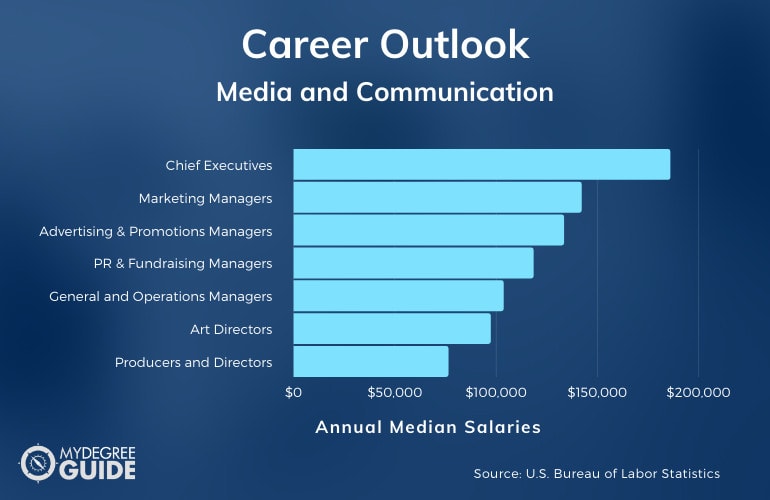
Earning a doctorate in media studies can put you on a path to a variety of careers related to media and communications.
According to the Bureau of Labor Statistics , media and communication occupations are expected to see 14% job growth over the next ten years.
Depending on your chosen focus for your doctorate in media studies, you may consider a future career in a variety of fields that relate to print, broadcast, cinematic, and online media formats.
Some professionals pursue a career in marketing or advertising, while others work in the media and public relations department of a corporation or political campaign. Media studies experts might also work as network executives or content producers. Those with a PhD may also pursue opportunities to research and teach in a college or university.
Media Studies Doctorate Curriculum & Courses

While each school will have its own curriculum for doctoral programs in media studies, the courses offered will likely include both required and elective courses, such as:
- Evolution of Film, Television, and New Media : This course explores the history of various types of media, from invention to present day.
- Media and Communication Theory : In this course, students will learn about different goals and methods of delivery in media.
- Qualitative Research in Media : This course examines how to carefully research and understand how people experience and interact with media.
- Quantitative Research in Media : This course studies how to research statistics and create case studies regarding media impact.
- Global Communication Theory : The internet allows us to share media around the world instantly, and this course explores the results.
- Regional Culture and Media : Regional nuances lead to differences in media creation and consumption, which will be reviewed in this course.
- Politics and Communication : In this course, you’ll examine how media and communication tactics are used in political situations.
- Impact of Media on Children : This course allows students the opportunity to research methods of creating and outcomes of media on children.
- Gender and Media Studies : This course evaluates social and cultural views of gender that are often reflected in mass media.
- Historical Media Policy : Over time, many laws and regulations have been placed on various media outlets, and this course will cover them.
Each program and school will have its own unique curriculum, so you may wish to take a close look at each program’s requirements before applying.
Admissions Requirements

Much like with programs leading to an online master’s in media studies , each online doctoral program for media studies will have its own requirements for admissions, so it’s strategic to review a school’s specific guidelines before submitting an application. Many schools require the following:
- GRE or GMAT scores (only some schools require them)
- Transcripts from undergraduate and graduate school
- Master’s degree in communication, media studies, or related field
- Personal statement, including goals and intent
- Letters of recommendation
Many schools also require students to complete an online application and provide a writing sample, which would be outlined in their admissions requirements.
Media Studies PhD Programs Accreditation
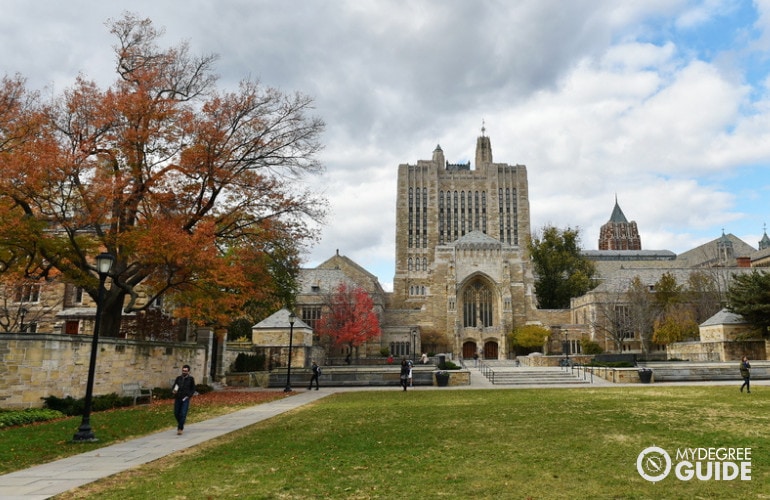
Many students who pursue their media studies PhD look for programs that are regionally accredited. These multimedia degree online or on-campus programs have been recognized for their educational excellence and adhere to national higher learning standards. There are potentially many benefits to choosing an accredited program.
Attending an accredited school is often an eligibility requirement for federal financial aid and other scholarship programs. Future employers and professional associations may also give preference to candidates who earned their degree at an accredited institution.
Each school should share their accreditation status, or you can visit the US Department of Education ’s website to search for the status of a specific school.
Financial Aid and Scholarships

Many schools provide a variety of resources for students who could use assistance paying for their tuition. Financial aid options can include scholarships and grants as well as teaching fellowships.
You might also choose to take a closer look at national, needs-based financial assistance programs. To determine if you qualify for a federal work-study program or other federal loans and grants, you can complete the online FAFSA , or Free Application for Federal Student Aid.
Additionally, you may qualify for educational assistance through your employer. Some companies offer grants or reimbursements to employees who are furthering their education. Other aid options include financial awards that are offered through community or private sponsors.
Is Media a Good Career?

Yes, media is a good career for many professionals. There are many roles to be explored within the field of media. Many doctoral graduates pursue a career in teaching. Others pursue leadership or senior positions in the media and communication field. The median salary for management occupations is $109,760 (Bureau of Labor Statistics).
Some professionals apply their training to advertising and marketing fields, in which their understanding of media impact can help them create and manage effective campaigns. The Bureau of Labor Statistics indicates an expected increase in employment for each of these fields. For example, employment for media and communication positions is expected to grow 14% over the next ten years, which is faster than average.
What Can You Do with a Media Studies PhD?
Professionals who earn a media studies PhD may pursue a variety of careers related to the focus and concentration they select during their studies. For example, those who examine the cultural impact of media on certain groups of people may work in politics or public relations.
Those who follow the impact of advertising across various media formats may continue into a role as an advertising executive. Those who quantify how people consume media may work for media outlets such as television networks or publishing houses. PhD holders also tend to pursue roles in research and academia.
How Long Does It Take to Get a Ph.D. in Media Studies Online?

Depending on the number of credit hours required, you can generally complete your doctorate in media studies in 3 to 5 years when studying full-time.
Many programs ask students to complete a dissertation or symposium to demonstrate their cumulative knowledge and research on a specific topic. This can include several credit hours of research or practical immersion into a media field.
A dissertation component will likely add to your time to completion. A doctoral program that does not require a dissertation may be completed in 3 years with full-time study.
How Much Does a PhD in Media Studies Cost?
The cost of a PhD in Media Studies depends on the program you choose. Some programs ask online students to pay by the credit hour, while others ask students to pay by the semester. You can take a look at the tuition fee schedule for each school for specifics.
Although tuition will vary between schools, many students pay around $400 to $1,300 per credit hour for doctoral programs in media studies. You may be asked to pay administrative fees as well, which is usually outlined in each school’s tuition fee guide.
What’s the Difference Between Journalism vs. Media Studies?
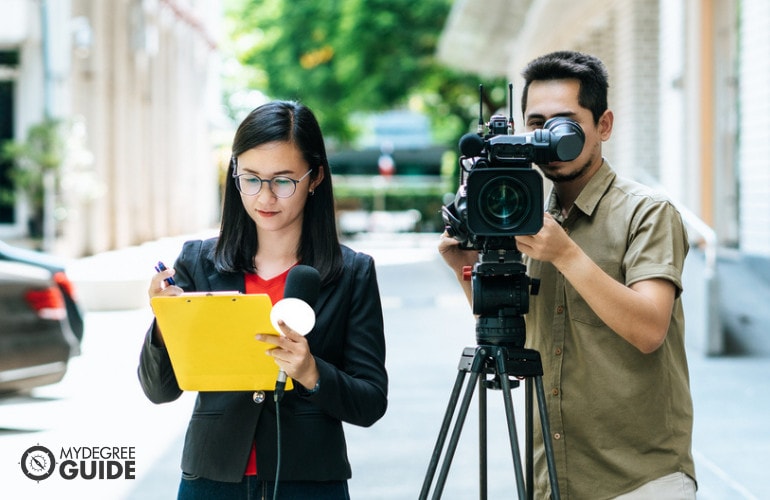
Journalism and media studies are different types of studies that can overlap.
Journalism focuses on:
- Researching current events
- Reporting news
- Producing and distributing true accounts
These stories can be shared or broadcast across a variety of media, including television, internet, print, and radio. On the other hand, media studies focuses on subjects such as:
- Media research and theory
- The relationship between media and gender, religion, sexuality, and age
- The impact culture, society, and media have on each other
Media studies includes all types of media, including text, digital, visual, and audio as well as film, games, and internet applications.
What’s the Difference Between Communication Studies vs. Media Studies?
Communication studies and media studies are closely linked, but they are not exactly the same.
While there is some interdisciplinary overlap, communication studies focuses on the message, while media studies emphasizes how a message is delivered.
Is a Doctorate in Media Studies Worth It?

Yes, a doctorate in media studies is worth it for many students. If you enjoy researching and analyzing a variety of different methods, theories, styles, and applications of media, a doctorate in media studies can open the doors to advanced career possibilities.
The Bureau of Labor Statistics projects 14% job growth for media and communication occupations and 12% job growth for postsecondary teachers over the next ten years. If you are currently involved in a media career, a doctoral program can let you further your studies in humanities or communications to focus on a specific type or overall impact of media.
Getting Your PhD in Media Studies Online

If you are interested in getting your PhD in Media Studies degree online , there is no time like the present to start researching and considering your options.
You can take a look at a variety of programs in new media studies online to determine which one best fits your personal interests and aligns with your future career goals. You can also explore the curriculum for the various online degree programs in communications to see if the required and elective courses reflect your own focus.
The Bureau of Labor Statistics indicates that employment opportunities in advertising, education, and media creation are on the rise. If you’re ready to enhance your expertise and qualifications in these fields, why not start exploring accredited universities offering digital media degrees online or on-campus today?

Top 10 Best Online Communications PhD Degree Programs (Doctorates)
We rank the best online PhD degree programs in communications.
Key Takeaways
- A number of graduate schools offer an online PhD in communications.
- A communications PhD program is a good fit for students with an interest in linguistics, media studies, organizational communication, post-secondary education, and more.
- The best online communication doctorates are regionally and programmatically accredited and prepare students for success in the job market.
Featured Programs
Online doctoral degree programs are growing in availability and credibility. However, only a select number of universities offer a full selection of PhD in communication programs online.
In most fields, an online PhD is considered a terminal degree, which means it is the highest degree that you can earn in your field. This means that online doctoral programs for PhD students in communication can lead to opportunities for leadership, public consultation, research, and post-secondary education in your field.
Online PhD in communication candidates are typically already working at a high level in their field. This means that students seeking their doctorate must balance existing work and personal responsibilities with a challenging course of education. For many graduate students, online courses and fully online programs provide a way to achieve this balance.
For a look at how these online doctoral programs stack up against traditional on campus programs, check out our look at the The Best Research Universities for Communications Degrees .
Or see the complete University Rankings Guide .
Otherwise, read on and learn more about how you can earn an online PhD in communication through a top-ranked online doctorate program.

About Accredited Online PhD in Communication Degree Programs
Online doctoral students have plenty of options, but quality and credibility are important when it comes to finding an online PhD. The best online doctorate programs will have proper accreditation:
- Institutional Accreditation : Accreditation is vital for online doctoral programs. It signifies that the online PhD programs offered by the graduate school are in compliance with the standards of a Department of Education-approved accrediting body.
A school must also be accredited in order to offer federal financial aid to its online doctorate candidates. When looking for an online doctoral program, seek out options with accreditation from a colleges and schools commission in your region. This stamp of approval is critical for ensuring the quality and credibility of your online program.
- Programmatic Accreditation : In addition to institutional accreditation, look for online doctorate degree programs with programmatic accreditation. Specialized programmatic accreditation can be an indication that certain online PhD programs are respected in your field. The Accrediting Council on Education in Journalism and Mass Communications (ACEJMC) is the key specialized accrediting agency in communications.
- Carnegie Classification : The Carnegie Classification of Institutions of Higher Education, or as it is more commonly known, the Carnegie Classification, is a framework for categorizing all accredited, degree-granting institutions in the United States. Originally formulated in 1970 by The Carnegie Foundation for the Advancement of Teaching, and administered through the University of Indiana’s Center for Postsecondary Research since 2014, the Carnegie Classification is “the leading framework for recognizing and describing institutional diversity in U.S. higher education.”
Under this classification, top research universities for doctoral degrees and PhD candidates are identified as either R2: Doctoral Universities for “high research activity” or R1: Doctoral Universities for “very high research activity.” Look for these classifications when considering options for your online Phd programs.
Key Point: The best online doctoral programs will have both institutional and programmatic accreditation.

Admission Requirements
Schools that offer online doctorate programs have different admission requirements. However, most online doctoral in communication programs will carry the same basic threshold for admission:
- A completed online application
- Official undergraduate college transcripts
- A cumulative GPA of at least 3.0
- GRE scores, MAT scores, or GMAT scores
- Letters of recommendation
- Personal interviews
- Personal statement or essay
- Plan of study
Key Point: In some cases, you’ll be eligible to enter a doctoral degree online after earning a bachelor’s degree. However, manyu specialized online PhD programs may require you to have earned a master’s degree as well.
Curriculum and Courses
As with other advanced degree and graduate programs, research is the central component of your online communications doctoral program. This is true for fully online doctorate degrees as well as hybrid degrees combining online education with traditional on-campus courses.
Regardless of whether you complete a traditional, hybrid or online doctoral program, the typical time to completion is three to five years.
The typical components of your online PhD program may include:
Foundational Courses
Your online PhD program will typically begin with a number of core courses in areas like technical communication, mass communication, strategic communication, and more. You will likely also take foundational courses in your area of concentration.
PhD program concentrations may include media and communication studies, health communication, political communication, and more. Foundational courses will also provide critical research skills including how to apply both quantitative research methods and qualitative research methods. You may be able to complete many of your communications program requirements through online classes.
Examinations for PhD Candidacy
Many online doctoral students are required to complete certain examinations to enter into online PhD candidacy. This will typically occur after you’ve completed one to two years of foundational courses.
Dissertation
The central component of most online PhD in communications programs will be the completion of a dissertation. After gaining status as an online PhD candidate, you will typically work closely with a professorial advisor or mentor to develop an original research question.
This research question will form the basis of your dissertation—an ongoing project designed to address this research question through applied research. While you will work closely with your advisor or mentor, much of your dissertation will be rooted in independent research. This is especially true for students pursuing an online PhD.
Oral Defense
Upon completion of the written portion of your dissertation—which will typically present the findings from your original research project—you will be expected to defend your findings. This “oral defense” will typically be conducted by a commission of professors and experts in your field. PhD candidates in some online degree programs may be able to conduct this defense via teleconferencing.
Teaching Requirements
Some online PhD programs will also include a teaching component, which will require you to work as an adjunct professor or teacher’s assistant in an undergraduate or graduate school. It may be possible for students in the online doctoral degree program to also serve teaching requirements by instructing online students.
Key Point: The online communications PhD is a research-focused degree. Your dissertation will be a central part of your online doctoral degree program.

Careers for Students Who Complete Online Communications Doctoral Degree Programs
Accredited online doctoral programs are generally terminal degree programs. This means that students who complete credible online doctoral programs in their field are generally eligible for top positions and opportunities in their field. This may indicate high paying opportunities for public policy research, post-secondary education, and editorship.
For instance, according to the Bureau of Labor Statistics the top 10% of earners in the field of Editing earned nearly $130,000 in 2021.
These higher earnings are reflective of the rarified professional opportunities that await those with a PhD in communications. Working professionals who earn an accredited online doctorate may be eligible to work in the following areas.
- Marketing and Consumer Research
- Publishing and Editing
- Public Relations
- Post-Secondary Education
- Public Policy Consultation
- Political Campaign Management
Key Points: According to the Bureau of Labor Statistics, students with a doctorate n communications will earn more than graduates with a bachelor’s or master’s degree.
What’s the difference between online doctoral programs and online PhD programs?
Technically, a PhD is a type of doctorate degree. This means that all online PhD candidates are doctoral students. By contrast, not all doctoral students are PhD candidates.
The primary distinction is that doctoral students are primarily focused on putting existing theories into practice. Depending on your chosen field, your online doctoral degree may require participation in an educational leadership program, engagement in clinical practice, work as a resident in a nursing program, and much more.
By contrast, online PhD students are focused on creating new knowledge in their area of study. This usually means that online PhD candidates are focused on introducing new theories, creating research projects around these theories, and presenting new findings that demonstrate a mastery of existing knowledge and the insight to introduce new ideas into the field.
Today, more working professionals than ever before are pursuing both online doctoral degrees and online Phd programs.
The Best Online Communications Doctorates (PhDs)
The online PhDs and doctorates in communication identified here are ranked based on influence, with weighting for graduation rate and full-time online enrollment.
University of Alabama
- #1 Best Grad Schools in Alabama 2024
- #1 Best Research Universities in Alabama 2024
- #1 Best Public Colleges in Alabama 2024
- #10 Best Research Universities for Social Work Degrees
- #11 Best Research Universities for Criminal Justice Degrees
- #25 Best Research Universities for Nursing Degrees
- #1 Best Online Bachelor's in Human Development Degree Programs for 2024
- #1 Best Online Bachelor’s in Marketing and Advertising Degree Programs for 2024
- #1 Best Online MBA Programs in Alabama
- #1 Best Online Colleges in Alabama 2024
- #1 Best Online Master’s in Educational Administration
- #1 Best Online Master's Programs in Alabama 2024
- #2 Best Online Master's in Kinesiology Degree Programs
- #2 Best Online Master's in Hospitality and Tourism Degree Programs
- #2 Best Online Master’s in Health Science
- #2 Best Online Master’s in Counseling
- #2 Best Online Bachelor's in Hospitality and Tourism Degree Programs for 2024
- #2 Best Online Bachelor’s in Child Development Degree Programs for 2024
- #3 Best Online Bachelor's in Interdisciplinary Studies Degree Programs for 2024
- #3 Best Online Bachelor's in Accounting
- #3 Best Online Master's in Organizational Leadership
- #4 Best Online Bachelor’s of Early Childhood Education Degree Programs for 2024
- #4 Best Online Bachelor's in Public Health Degree Programs for Students
- #6 Best Online Bachelor’s in Business Administration Degree Programs
- #6 Best Online Master's in Marketing and Advertising
- #6 The Best Online Colleges Ranked for Students in 2024
- #6 Top 20 Best Online Accredited Doctorate Degree Programs (PhDs) 2024
- #6 Best Online Doctorate in Education Degree Programs Ranked for Students
- #6 Best Research Universities with Online Doctorates (PhDs) 2024
- #6 Best Online Master's in Special Education
- #8 Best Online Master’s in Communications
- #8 Best Online Bachelor's in Criminal Justice
- #8 Best Online Master's in Nursing MSN
- #11 Top 20 Best Online MBA Programs that Can Be Completed in One Year 2024
- #11 Best Online Master's in Social Work MSW
- #15 Top 50 Best No GRE Online PhD Degree Programs (Doctorates)
- #17 Best Online Master’s in Engineering
- #21 Best Online Master's Programs 2024
- #24 Best Online Master's in Management
Tuition + fees
Student body
Median SAT/ACT
Career Outlook for Communications degree at University of Alabama
University of Alabama’s faculty and alumni have been influential in:
- Social Work
- Mathematics
- Anthropology
- Political Science
- Engineering
Most Influential Alumni
- Edward O. Wilson
- Timothy Leary
- George Armitage Miller
- Bernie Madoff
- Nathan Jacobson
- John Ridley Stroop
- George W. Snedecor
- Mohammad Ataul Karim
What do we love about University of Alabama?
University of Alabama was founded in the city of Tuscaloosa, Alabama in 1820. Emerging in the immediate aftermath of Alabama’s statehood, Bama is the oldest institution of higher learning in Alabama.
And today, a student body of more than 38,000 undergraduates and postgraduates makes this public research university the largest school in the state of Alabama.
University of Alabama’s Communication and Information Sciences doctoral degree program is noted for its multidisciplinary approach to the study of communication and information sciences.
Enjoy a strong athletics program. The University of Alabama Crimson Tide enjoy a heated cross-state rivalry with the Tigers of Auburn University.
Prefer a more intimate learning environment. University of Alabama is noted for the size of its student body, the scope of its academic offerings, and the expansiveness of its campus facilities.

American University
- #3 Best Private Colleges in DC 2024
- #3 Best Grad Schools in DC 2024
- #3 Best Colleges in DC 2024
- #9 Best Research Universities for Criminal Justice Degrees
- #23 Best Research Universities for Communications Degrees
- #24 Best Research Universities for Education Degrees
- #3 Best Online Master's Programs in DC 2024
- #4 Best Online MBA Programs in DC
- #7 Top 15 Most Affordable Online Economics PhD Programs (Doctorates) 2024
- #12 Best Online MBA Degree Programs for 2024 with No GMAT Required
- #13 Top 20 Best Online MBA Programs that Can Be Completed in One Year 2024
- #4 How to Earn Your Master's Degree Without Your Bachelor's Degree
Career Outlook for Communications degree at American University
What do we love about american university.
American University is a private research university located in Washington D.C. American University was actually formed by an act of Congress in 1893.
Today, American University is home to more than 8000 undergraduates and more than 6000 graduate students.
Its doctoral-level communications program demonstrates the close connection between American University and the city it calls home. The AU School of Communication’s Doctor of Philosophy in Communication gives PhD candidates a chance to conduct independent research at the intersection of media, technology, and democracy. /p>
Have an interest in public service, political affairs, and government work. Its location in the nation’s capital makes American University a feeder school for many government opportunities.
Are seeking a more affordable degree program. American University provides generous student amenities but these expenses are reflected in the cost of attendance.
University of Colorado Boulder
- #1 Best Grad Schools in Colorado 2024
- #1 Best Online Master's Programs in Colorado 2024
- #2 Best Online Colleges in Colorado 2024
Career Outlook for Communications degree at University of Colorado Boulder
University of Colorado Boulder’s faculty and alumni have been influential in:
- Earth Sciences
- Computer Science
- George Gaylord Simpson
- Sidney Altman
- Scott Carpenter
- Jeffrey Beall
- Jack Williamson
- Steven M. Wise
- Marc Bekoff
- Kenneth R. Miller
- Terrence Deacon
- Theodore Maiman
- Eugene Myers
What do we love about the University of Colorado Boulder?
The University of Colorado Boulder was founded in 1876 and was, in fact, established five months before Colorado achieved statehood. This makes it the flagship university in the state’s public university system.
The University of Colorado Boulder, located in the mid-sized city of Boulder, is home to a decidedly large student population. Roughly 38,000 students are currently in pursuit of their undergraduate and postgraduate degrees at Boulder.
Among its noteworthy graduate degree programs, the University of Colorado Boulder offers a PhD in Communication to students who have earned a master’s degree in a related subject.
Are pursuing advanced degrees. Boulder ranks among R1: Doctoral Universities, so noted for their very high level of research activity.
Are looking for an intimate college experience. Though the Boulder campus is routinely ranked among the most beautiful colleges in the nation, it is also the largest school in the state of Colorado.
Clemson University
- #2 Best Grad Schools in South Carolina 2024
- #2 Best Public Colleges in South Carolina 2024
- #1 Best Online MBA Programs in South Carolina
- #2 Best Online Master's Programs in South Carolina 2024
- #2 Most Unusual Doctoral Degrees You Can Earn Online (PhDs)
- #2 Best Online Colleges in South Carolina 2024
- #4 Best Online Master’s in Emergency Management
- #4 Best Online Master's in Biology
- #8 Best Online Master’s in Human Resources
- #9 Best Online Master’s in Sustainability and Green Technologies
- #9 Best Research Universities with Online Doctorates (PhDs) 2024
- #11 Top 20 Best Online Accredited Doctorate Degree Programs (PhDs) 2024
- #18 Best Data Science Online Master’s Programs
- #18 Best Online Master's in Special Education
- #20 Fastest Online Bachelor's Degrees Ranked for 2024
- #20 Fastest Online Doctoral Degree Programs Ranked for Students in 2024
- #24 Best Online Master’s in Engineering
Career Outlook for Communications degree at Clemson University
Clemson University’s faculty and alumni have been influential in:
- James Dickey
- Strom Thurmond
- John Edwards
- Jo Jorgensen
- Anthony Bradley
- James F. Byrnes
- Warren E. Dixon
- Dolph Lundgren
- Thomas Naylor
- Horace Grant
- Dwight Clark
- Deshaun Watson
What do we love about Clemson University?
Clemson University was founded in 1889 and began life as the Clemson Agricultural College. Today, the public land-grant university occupies 1400 acres alongside Lake Hartwell in Clemson, South Carolina.
With more than 25,000 students pursuing degrees at both the undergraduate and postgraduate levels, Clemson University ranks as the second largest university in the state of South Carolina.
Clemson is included in the list of R1: Doctoral Universities, those noted for their high level of research activity. Clemson offers an array of unique advanced degree programs, such as its doctoral program in Rhetorics, Communication, and Information Design , which emphasizes “an overall balance of ecologies in rhetorics and communication with emphasis on rhetorics and digital information design.”
Enjoy college athletics. Clemson’s Tigers enjoy an enormous cultural presence both on campus and in the surrounding region.
Are looking for a college in a lively area. Clemson is located in the foothills of the picturesque Blue Ridge Mountains, but this also means that the university is a two hour drive from the nearest city.

Texas Tech University
- #7 Best Colleges in Texas 2024
- #1 Best Online Colleges in Texas 2024
- #1 Best Online Master's in English
- #2 Best Online Bachelor's of English Degree Programs for 2024
- #2 Best Online Certificate in Liberal Arts and Humanities Ranked for Students
- #2 Best Online MBA Programs in Texas
- #2 Top 8 Best Online Public Health PhD Degree Programs (Doctorates)
- #3 Top 5 Best Online English PhD Degree Programs (Doctorates)
- #3 Fastest Accelerated Online Doctorate of Information Technology
- #4 10 Fastest Accelerated Online Master's of English Programs
- #4 Top 10 Best Online Master's of Public Relations Ranked 2024
- #5 Best Online Bachelor’s of Communications Degree Programs for 2024
- #5 Best Online Bachelor’s of Digital Media for 2024
- #5 20 Fastest Accelerated Online English Doctorates (PhDs) 2024
- #6 Best Online Bachelor’s of Early Childhood Education Degree Programs for 2024
- #6 Best Online Master’s in Engineering Management
- #7 Best Online Master's Programs in Texas 2024
- #7 Best Online Master's in Agriculture and Agribusiness Degree Programs
- #7 Best Online Bachelor's in Sociology Degree Programs Ranked for 2024
- #8 10 Best Online Master's of Music Education Degree Programs
- #8 The Most Affordable Online Clinical Nutrition Doctorate Degree Programs (PhDs) 2024
- #9 Best Online Doctorate of Educational Psychology (PhDs) 2024
- #10 Best Online Master’s in Communications
- #11 Best Online Master's in Marketing and Advertising
- #12 The Best Online Colleges Ranked for Students in 2024
- #12 Top 20 Most Affordable Online Doctorate of Education (PhDs)
- #14 Best Online Master's in Computer Science Degree Programs
- #14 Best Online Master's in Special Education
- #14 Best Online Master’s in Engineering
- #15 Best Online Doctorate in Education Degree Programs Ranked for Students
- #15 Best Online Master’s in Education
- #16 Best Research Universities with Online Doctorates (PhDs) 2024
- #20 Top 20 Best Online Accredited Doctorate Degree Programs (PhDs) 2024
- #20 Best Data Science Online Master’s Programs
- #23 The Best Online MBA Degree Programs in 2024 Ranked for Students
- #23 Top 50 Best No GRE Online PhD Degree Programs (Doctorates)
Career Outlook for Communications degree at Texas Tech University
What do we love about texas tech university.
Texas Tech University began life as the Texas Technical College with its founding 1923. Based in Lubbock, Texas Tech is considered the primary institution among the five schools making up the Texas Tech University System.
Taking its present name in 1969, Texas Tech University would become the sixth-largest institution in the state of Texas. Today, there are more than 40,000 students earning degrees at both the undergraduate and postgraduate levels at the public research university.
Texas Tech is particularly noteworthy as a destination for prospective PhDs. Texas Tech is classified among R1: Doctoral Universities, so noted for their very high research activity. This includes opportunities for doctoral level students interested in Texas Tech’s PhD in Media and Communication .
Like a college with strong school spirit. Students repeatedly note that the school spirit is a major feature of campus life, which can make Texas Tech feel like one big community.
Are looking for a small campus. Like a lot of other things in Texas, Texas Tech is a sprawling campus. Students note that the sheer distance of walking between classes can sometimes be exhausting.
Colorado State University
- #3 Best Grad Schools in Colorado 2024
- #4 The Most Influential Universities and Colleges Ranked by State 2024
- #3 Best Online Master's Programs in Colorado 2024
- #4 Best Online Colleges in Colorado 2024
- #4 Top 5 Best Online Sociology PhD Degree Programs (Doctorates) 2024
- #5 Online Colleges That Start Anytime and the Benefits of a Self-Paced Education
- #6 Best Online MBA Programs in Colorado
- #9 Most Affordable Online Sociology Doctorate Programs (PhDs)
- #15 Best Online Bachelor's in Construction Management Degree Programs
- #24 Top 50 Best No GRE Online PhD Degree Programs (Doctorates)
Career Outlook for Communications degree at Colorado State University
Colorado State University’s faculty and alumni have been influential in:
- Jean Bethke Elshtain
- Steve Hanke
- Yusef Komunyakaa
- Elaine Ingham
- Mark Mattson
- Rebecca Skloot
- Ibrahim Abdulaziz Al-Assaf
- William Tietz
- James van Hoften
- Jenna Ellis
- Martin J. Fettman
- Anwar al-Awlaki
What do we love about Colorado State University?
Colorado State University was formed in 1870 as the flagship institution in what would become the Colorado state school system. The Fort Collins-based public research university is noted today for including the biomedical sciences, engineering, environmental science, and more.
Colorado State University was formed as a small agricultural school in the years leading up to Colorado’s 1876 statehood. Today, Colorado State serves more than 34,000 students.
Colorado State University is noted for its top-ranked graduate courses and degree programs, such as its PhD in Communication .
Are pursuing careers in healthcare. Colorado State ranks high for spending on its various medical sciences programs.
Are seeking a small campus experience.
University of North Dakota
- #1 Most Affordable Colleges in North Dakota 2024
- #1 Best Public Colleges in North Dakota 2024
- #1 Best Research Universities in North Dakota 2024
- #1 Best Colleges in North Dakota 2024
- #1 Best Online MBA Programs in North Dakota
- #1 Best Online Bachelor's in Cybersecurity Programs in North Dakota
- #1 Best Online Colleges in North Dakota 2024
- #1 Best Online Master's Programs in North Dakota 2024
- #3 Best Online Bachelor's of Cybersecurity Degree Programs in Montana
- #6 Online Colleges That Start Anytime and the Benefits of a Self-Paced Education
- #3 10 Best Accelerated Online PhD Programs Ranked for Students in 2024
Career Outlook for Communications degree at University of North Dakota
University of North Dakota’s faculty and alumni have been influential in:
- Communications
- Phil Jackson
- Maxwell Anderson
- Vilhjalmur Stefansson
- Chuck Klosterman
- Thomas McGrath
- George A. Lundberg
- Jonathan Toews
- Michael Rustad
What do we love about the University of North Dakota?
The University of North Dakota’s history actually predates North Dakota statehood by a full six years. Formed in 1883 by the Dakota Territorial Assembly, this Grand Forks-based university began as a liberal arts institution before expanding to include scientific research.
Today, the University of North Dakota is classified among R2: Doctoral Universities, noted for their high level of research activity. UND is currently home to more than 13,000 students pursuing degrees at the undergraduate and postgraduate levels.
The University of North Dakota is noted for its excellent array of doctoral level research programs such as its Communication PhD .
Are seeking options for getting involved. Current students praise the wide range of clubs and activities offered to UND students.
Don’t have a high tolerance for cold weather. Temperatures on campus dip well below freezing throughout the winter months.
Liberty University
- #2 Best Christian Colleges in Virginia 2024
- #3 Best Private Colleges in Virginia 2024
- #7 Best Research Universities in Virginia 2024
- #7 Best Grad Schools in Virginia 2024
- #9 Best Colleges in Virginia 2024
- #19 Best Research Universities for Criminal Justice Degrees
- #21 Best Research Universities for Social Work Degrees
- #1 Top 10 Best Online Counseling PhD Degree Programs (Doctorates)
- #1 Best Online Bachelor's in Math Degree Programs Ranked for Students
- #1 Best Online Colleges in Virginia 2024
- #1 Best Online Associate Degrees in Virginia 2024
- #1 Best Online Associate in Economics
- #1 Best Online Associate in Philosophy
- #1 Top 16 Most Affordable Online Counseling PhDs (Doctorates)
- #1 Best Online Bachelor's in Music Degree Programs Ranked for 2024
- #1 Most Affordable Online PhDs in Psychology Ranked for 2024
- #1 Best Online Bachelor's in Christian Counseling Degree Programs
- #1 Accelerated Online Business Administration PhD Programs (Doctorates)
- #1 Top 15 Most Affordable Online Economics PhD Programs (Doctorates) 2024
- #1 Best Online Associate in Education
- #1 Best Online Associate in Mathematics
- #1 Top 10 Best Online Bachelor's of Nursing (BSN) Programs
- #2 10 Best Online Bachelor's of Forensic Psychology Programs
- #2 Best Online Associate in Early Childhood Education
- #2 Top 10 Best Online Master's of Psychology Degree Programs 2024
- #2 Best Online Bachelor's in Religious Studies Degree Programs for 2024
- #2 How To Get an Online Master’s Degree in Biblical Studies
- #2 Best Online Bachelor’s in Public Administration Degree Programs for 2024
- #2 Top 3 Best Online Economics PhD Degree Programs (Doctorates)
- #2 15 Fastest Accelerated Online Master's of Psychology Programs
- #2 Fastest Accelerated Online Bachelor's of Information Technology
- #2 Best Online Associate in Biblical Studies
- #3 10 Fastest Accelerated Online Bachelor's of English
- #3 Best Online Bachelor's in Cybersecurity in Virginia
- #3 Best Online Degrees for a Career in Teaching Ranked 2024
- #3 Best Online History Doctorate Degree Programs (PhDs) 2024
- #3 Best Online Bachelor’s of Christian Ministry Degree Programs for 2024
- #3 Best Online Associate in Paralegal Studies
- #3 Top 5 Best Online Criminal Justice Doctorates (PhDs) 2024
- #3 Best Online Master's in Theology
- #3 Fastest Accelerated Online Healthcare Administration Masters
- #3 Best Online Bachelor's in Cybersecurity in the District Of Columbia
- #3 Most Affordable Online Criminal Justice PhDs (Doctorates)
- #3 Fastest Accelerated Online Bachelor's of Cybersecurity
- #4 Best Online Associate in Accounting
- #4 Best Online MBA Programs in Virginia
- #4 Best Online Bachelor's in Cybersecurity in Illinois
- #4 Top 20 Best Online Accredited Doctorate Degree Programs (PhDs) 2024
- #4 Best Online Doctorate in Organizational Leadership Degree Programs
- #4 Top 8 Fastest Accelerated Online Psychology Doctorates (PhDs)
- #4 Most Affordable Online PhD Programs Ranked for Students in 2024
- #4 Top 15 Most Affordable Online Information Technology PhD Programs
- #4 Top 15 Fastest Accelerated Online Counseling Doctorates (PhDs)
- #4 Best Online Associate in Psychology
- #4 Best Online Bachelor’s of Elementary Education Degree Programs for 2024
- #5 Top 10 Fastest Accelerated Online PhD in Criminal Justice (Doctorates)
- #5 Top 20 Easiest Online Degrees from Accredited Schools in 2024
- #5 Best Online Master's Programs in Virginia 2024
- #5 Best Online Bachelor’s in Biblical Studies
- #5 Fastest Accelerated Online Doctorate of Information Technology
- #6 Best Online Bachelor's of English Degree Programs for 2024
- #6 Best Online Bachelor’s of Graphic Arts Degree Programs for 2024
- #6 10 Fastest Accelerated Online Master's of Accounting Programs
- #6 Best Online Master’s in Biblical Studies
- #6 Best Online Bachelor's in Strategic Communications Degree Programs
- #7 The Best Online Christian Colleges and Universities for Bachelor's Degrees
- #7 Best Online Doctorate of Educational Psychology (PhDs) 2024
- #7 Online Colleges That Start Anytime and the Benefits of a Self-Paced Education
- #8 Best Online Associate in History Degrees
- #8 Top 20 Most Affordable Online Bachelor's of Cybersecurity
- #8 Top 20 Most Affordable Online Business Administration Doctorates
- #9 Best Online Bachelor’s of Early Childhood Education Degree Programs for 2024
- #9 Most Unusual Doctoral Degrees You Can Earn Online (PhDs)
- #9 Best Online Bachelor's in Law and Legal Studies Degree Programs for 2024
- #9 Best Online Bachelor’s of Data Science and Analytics Degree Programs for 2024
- #9 Best Online Bachelor’s of Education Degree Programs for 2024
- #9 Best Online Associate's in Physics
- #9 Best Online Master's in Biology
- #9 Best Online Associate in Business Administration
- #10 Best Online Bachelor's in Social Work Degree Programs Ranked for 2024
- #10 Best Online Bachelor’s of Data Science and Analytics Degree Programs for 2024
- #10 Best Online Bachelor's in Interdisciplinary Studies Degree Programs for 2024
- #10 Best Online Bachelor's in Network Administration Degree Programs for 2024
- #11 Best Online Doctorate in Business Administration Degree Programs
- #11 Top 20 Most Affordable Online Master's of Nursing Programs
- #11 Best Online Bachelor's of Finance Degree Programs for 2024
- #12 Best Online Bachelor’s of History Degree Programs Ranked for 2024
- #12 Best Online Master's in Project Management
- #12 Best Online Master's in Sports Management
- #12 Most Affordable Online Applied Behavioral Analysis PhD Programs
- #13 Best Online Bachelor’s of Homeland Security Degree Programs for 2024
- #13 20 Fastest Accelerated Online English Doctorates (PhDs) 2024
- #14 Best Online Bachelor's in Sports Management Degree Programs for 2024
- #14 Best Online Bachelor's of Healthcare Administration Degree Programs for 2024
- #14 Top 18 Most Affordable No GRE Online PhD Degree Programs
- #15 Best Online Christian Colleges and Universities for Master's Degrees
- #16 Best Online Associate in Criminal Justice
- #17 Best Online Bachelor’s in Marketing and Advertising Degree Programs for 2024
- #17 Most Affordable Online Criminology Doctorate Programs (PhDs)
- #18 Top 20 Most Affordable Online Doctorate of Education (PhDs)
- #18 Most Affordable Online Master's Degree Programs Ranked for Students
- #18 Best Online Bachelor's in Computer Science Degree Programs
- #18 Best Online Master’s in Finance
- #20 Best Online Bachelor's in Accounting
- #21 Best Online Bachelor's in Cybersecurity
- #23 Best Online Master’s in Counseling
- #25 Best Online Associate in Christian Ministry
- #25 Best Online Bachelor's of Economics Degree Programs for 2024
- #6 10 Best Accelerated Online PhD Programs Ranked for Students in 2024
- #6 How to Earn Your Master's Degree Without Your Bachelor's Degree
- #6 Best College Majors that Offer Accelerated Degree Programs
Career Outlook for Communications degree at Liberty University
What do we love about liberty university.
Liberty University is one of the largest Christian universities in the world as well as one of the largest private non-profit universities in the U.S. Much of this size is based on its online enrollment.
Liberty University enrolls roughly 15,000 residential students across its 17 colleges, and an additional 80,000 through its extensive online course and degree offerings.
Liberty University is noted for the sheer volume of advanced degrees and online degrees earned by its student body. With more than 47,000 students pursuing advanced degrees, Liberty offers an extremely wide range of online doctoral programs, including its PhD in Communication Online program.
Wish to attend the world’s largest seminary—Liberty University’s Rawlings School of Divinity.
Students who do not identify with Evangelical Christianity.
Regent University
- #1 Best Online Bachelor’s of Graphic Arts Degree Programs for 2024
- #2 Best Online Bachelor's in Cybersecurity in Virginia
- #2 Best Online Associate in Christian Ministry
- #2 Best Online Bachelor's in Cybersecurity in the District Of Columbia
- #2 Top 15 Fastest Accelerated Online Counseling Doctorates (PhDs)
- #2 Best Online Doctorate of Educational Psychology (PhDs) 2024
- #3 Best Online Associate in History Degrees
- #3 Top 10 Best Online Counseling PhD Degree Programs (Doctorates)
- #3 How To Get an Online Master’s Degree in Biblical Studies
- #3 Best Online Associate Degrees in Virginia 2024
- #3 Top 16 Most Affordable Online Counseling PhDs (Doctorates)
- #3 Best Online Bachelor's in Music Degree Programs Ranked for 2024
- #4 Best Online History Doctorate Degree Programs (PhDs) 2024
- #5 Best Online MBA Programs in Virginia
- #5 Best Online Bachelor's in Law and Legal Studies Degree Programs for 2024
- #5 Best Online Bachelor’s of Christian Ministry Degree Programs for 2024
- #5 Best Online Bachelor’s of Counseling Degree Programs for 2024
- #5 Best Online Associate in Psychology
- #6 Best Online Bachelor’s in Biblical Studies
- #6 Fastest Accelerated Online Bachelor's of Information Technology
- #7 Best Online Master's in Organizational Psychology
- #7 Best Online Colleges in Virginia 2024
- #7 Best Online Master's in Theology
- #7 15 Fastest Accelerated Online Master's of Psychology Programs
- #8 Fastest Online Associate Degrees Ranked for 2024
- #8 Best Online MBA in Entrepreneurship Ranked for Students in 2024
- #8 Best Online Master’s in Human Services
- #8 Most Affordable Online PhDs in Psychology Ranked for 2024
- #9 Top 20 Easiest Online Degrees from Accredited Schools in 2024
- #9 Best Online Master's Programs in Virginia 2024
- #10 Best Online Associate in General Studies
- #10 Fastest Accelerated Online Public Health Doctorates (PhDs)
- #10 Best Online Bachelor's of Theology Degree Programs in 2024
- #10 Best Online Bachelor’s of Digital Media for 2024
- #10 Best Online Bachelor's in Computer Science Degree Programs
- #10 Most Affordable Online Applied Behavioral Analysis PhD Programs
- #12 Top 20 Most Affordable Online Bachelor's of Cybersecurity
- #12 20 Fastest Accelerated Online English Doctorates (PhDs) 2024
- #14 Best Online Bachelor's of Economics Degree Programs for 2024
- #14 Best Online Master’s in Biblical Studies
- #15 Best Online Bachelor's in Sports Management Degree Programs for 2024
- #16 Most Affordable Online PhD Programs Ranked for Students in 2024
- #17 Best Online Bachelor's of English Degree Programs for 2024
- #19 Best Online Bachelor’s in Information Technology Degree Programs for 2024
- #21 Best Online Master’s in Emergency Management
- #23 Best Online Bachelor’s of Early Childhood Education Degree Programs for 2024
- #24 Best Online Bachelor’s of History Degree Programs Ranked for 2024
- #24 Best Online Master’s in Counseling
- #10 20 Fastest Accelerated Online MBA Degree Programs Ranked for 2024
Career Outlook for Communications degree at Regent University
What do we love about regent university.
Regent University is a private Christian University that provides an array of both undergraduate and graduate degree programs. Founded in 1977 by Southern Baptist Minister Pat Robertson, Regent University offers a wide range of both online and on-campus degree programs.
Regent University serves more than 10,000 students today, with many pursuing online degrees at the master’s and doctoral degree levels.
Regent University is also noteworthy for its extremely diverse range of online doctoral degree programs, including an Online PhD in Communication .
Are pursuing advanced degrees online. More than 60% of Regent’s students are in post-graduate programs.
Prefer a secular educational experience.
Walden University
- #2 Most Affordable Online Criminology Doctorate Programs (PhDs)
- #3 Top 8 Fastest Accelerated Online Psychology Doctorates (PhDs)
- #4 Best Online Doctorate of Educational Psychology (PhDs) 2024
- #4 Accelerated Online Business Administration PhD Programs (Doctorates)
- #5 Top 10 Best Online Counseling PhD Degree Programs (Doctorates)
- #5 Top 5 Best Online Sociology PhD Degree Programs (Doctorates) 2024
- #6 Top 5 Best Online Criminal Justice Doctorates (PhDs) 2024
- #7 Top 15 Most Affordable Online Information Technology PhD Programs
- #7 Top 15 Fastest Accelerated Online Counseling Doctorates (PhDs)
- #7 Most Affordable Online Applied Behavioral Analysis PhD Programs
- #8 Top 8 Best Online Applied Behavioral Analysis PhDs (Doctorates)
- #10 Most Unusual Doctoral Degrees You Can Earn Online (PhDs)
- #10 Top 20 Most Affordable Online Business Administration Doctorates
- #10 Fastest Accelerated Online Doctorate of Information Technology
- #12 15 Most Affordable Online Public Health Doctorates (PhDs)
- #2 The Fastest Traditional MBA Degree Programs Ranked for 2024
- #8 How to Earn Your Master's Degree Without Your Bachelor's Degree
Career Outlook for Communications degree at Walden University
What do we love about walden university.
Walden University is a private online school with headquarters in Minneapolis, Minnesota. Walden operates on a for-profit business model.
Walden University was established in 1970 with the goal of helping working adults–specifically those in education–earn their doctoral degree. Today, Walden serves nearly 50,000 students in countless areas of study.
Walden University offers several online doctoral programs through its Departement of Business Administration and Communication including its PhD in Management, which is available as both a full program and a completion program.
Are studying nursing, public health, and healthcare administration. Walden is one of the nation’s top degree providers in these fields.
Plan to earn PhDs in psychology. Walden’s PhDs do not have accreditation from the American Psychological Association (APA).
Other Options for Aspiring Communication PhDs
Students considering an online doctoral in communications should also check out the best on-campus options to compare features like cost, curriculum, acceptance rate, and more.
New York University
- #23 50 Best Research Universities Ranked for Undergrads in 2024
- #2 Best Research Universities in New York 2024
- #2 Best Colleges in New York 2024
- #2 Best Grad Schools in New York 2024
- #2 Best Private Colleges in New York 2024
- #3 The Most Influential Universities and Colleges Ranked by State 2024
- #3 Best Research Universities for Social Work Degrees
- #3 Best Research Universities for Education Degrees
- #7 Best Research Universities for Communications Degrees
- #7 Best Research Universities for Business Degrees
- #8 Best Research Universities for English Degrees
- #8 Best Research Universities for Nursing Degrees
- #12 Best Research Universities for Psychology Degrees
- #12 Best Research Universities for Philosophy Degrees
- #12 Best Research Universities for Economics Degrees
- #14 Best Research Universities for Sociology Degrees
- #15 Best Research Universities for Anthropology Degrees
- #15 Best Research Universities for History Degrees
- #15 Best Research Universities for Religious Studies Degrees
- #15 Best Research Universities for Political Science Degrees
- #15 Best Research Universities for Math Degrees
- #18 Best Research Universities for Computer Science Degrees
- #18 Best Research Universities for Biology Degrees
- #23 Best Research Universities for Engineering Degrees
- #23 Best Research Universities for Physics Degrees
- #1 20 Best Online Master's of Speech Pathology Degree Programs
- #1 Best Online Master's Programs in New York 2024
- #1 Best Online Master's in Management
- #1 Top 5 Best Online English PhD Degree Programs (Doctorates)
- #1 Best Online Master's Programs 2024
- #2 Top 6 Best Online Clinical Nutrition PhD Degree Programs (Doctorates)
- #3 Top 5 Best Online Sociology PhD Degree Programs (Doctorates) 2024
- #3 Fastest Online Master's Degrees Ranked for Students in 2024
- #5 Top 20 Best Business Schools for MBAs Ranked for Students
- #7 The Best Traditional MBA Programs Ranked for Students in 2024
Career Outlook for Communications degree at New York University
New York University’s faculty and alumni have been influential in:
- Erich Fromm
- Robert Mueller
- Martha Nussbaum
- John Archibald Wheeler
- Glenn Greenwald
- Howard Zinn
- Eric Kandel
- Lewis Mumford
- Alvin Toffler
- Louis Nirenberg
University of Michigan
- #4 Top Schools that Offer Free Master's Degrees Online
- #9 Best Universities in the US Ranked for Prospective Students in 2024
- #11 50 Best Graduate Schools Ranked for Prospective Students in 2024
- #11 Best Universities in the World 2024
- #22 50 Best Research Universities Ranked for Undergrads in 2024
- #1 Best Research Universities in Michigan 2024
- #1 The Most Influential Universities and Colleges Ranked by State 2024
- #1 Best Colleges in Michigan 2024
- #1 Best Grad Schools in Michigan 2024
- #1 Most Affordable Colleges in Michigan 2024
- #1 Best Public Colleges in Michigan 2024
- #2 Best Research Universities for Education Degrees
- #4 Best Research Universities for Business Degrees
- #5 Best Research Universities for Nursing Degrees
- #6 Best Research Universities for Psychology Degrees
- #6 Best Research Universities for Communications Degrees
- #8 Best Research Universities for Anthropology Degrees
- #8 Best Research Universities for Sociology Degrees
- #9 Best Research Universities for History Degrees
- #10 Best Research Universities for Computer Science Degrees
- #11 Best Research Universities for Engineering Degrees
- #11 Best Research Universities for Philosophy Degrees
- #11 Best Research Universities for Math Degrees
- #11 Best Research Universities for Economics Degrees
- #12 Best Research Universities for English Degrees
- #12 Best Research Universities for Political Science Degrees
- #13 Best Research Universities for Earth Sciences Degrees
- #13 Best Research Universities for Physics Degrees
- #13 Best Research Universities for Chemistry Degrees
- #13 Best Research Universities for Biology Degrees
- #14 Best Research Universities for Religious Studies Degrees
- #1 Best Online MBA Programs in Michigan
- #1 Best Online Master's Programs in Michigan 2024
- #1 Best Online Master’s in Health Science
- #1 Best Online MBA Degree Programs No GRE Required Ranked for 2024
- #1 Top 8 Best Online Public Health PhD Degree Programs (Doctorates)
- #1 Top 5 Best Online Sociology PhD Degree Programs (Doctorates) 2024
- #1 Fastest Online Master's Degrees Ranked for Students in 2024
- #2 Best Online History Doctorate Degree Programs (PhDs) 2024
- #2 Best Online Master's Programs 2024
- #2 Top 5 Best Online Sociology PhD Degree Programs (Doctorates) 2024
- #3 Top 3 Best Online Economics PhD Degree Programs (Doctorates)
- #4 Top 6 Best Online Clinical Nutrition PhD Degree Programs (Doctorates)
- #6 Guide to Free Online Courses for MBA Students in 2024
- #5 The Best Traditional MBA Programs Ranked for Students in 2024
Career Outlook for Communications degree at University of Michigan
University of Michigan’s faculty and alumni have been influential in:
- Claude Shannon
- Arthur Miller
- Alvin Plantinga
- George Dantzig
- Edgar F. Codd
- Hans-Hermann Hoppe
- Stephen Smale
- Urie Bronfenbrenner
- John Henry Holland
- Amos Tversky
- Marshall Sahlins
Boston University
- #3 Best Private Colleges in Massachusetts 2024
- #3 Best Research Universities in Massachusetts 2024
- #3 Best Research Universities for Criminal Justice Degrees
- #13 Best Research Universities for Communications Degrees
- #15 Best Research Universities for Education Degrees
- #24 Best Research Universities for English Degrees
- #25 Best Research Universities for Religious Studies Degrees
- #1 Best Online Master's Programs in Massachusetts 2024
- #1 Best Online Master's in Marketing and Advertising
- #1 Fastest Online Bachelor's Degrees Ranked for 2024
- #1 Best Online Colleges in Massachusetts 2024
- #1 Best Online Master's in Art Education and Art Administration
- #1 Best Online Degree Completion Programs for Returning Students
- #2 10 Best Online Master's of Music Education Degree Programs
- #2 Best Online Master's in Project Management
- #2 Best Online MBA Degree Programs No GRE Required Ranked for 2024
- #2 Best Online Master’s in Finance
- #3 Best Online Master’s in Communications
- #3 Best Online Master's in Social Work MSW
- #3 Best Online MBA Degree Programs for 2024 with No GMAT Required
- #3 Fastest Online Doctoral Degree Programs Ranked for Students in 2024
- #4 Most Unusual Doctoral Degrees You Can Earn Online (PhDs)
- #4 Best Data Science Online Master’s Programs
- #6 Fastest Accelerated Online Computer Science Doctorates (PhDs)
- #7 Best Online Master's in Management
- #7 Best Online Master's Programs 2024
- #7 Best Online Master's in Criminal Justice
- #13 Fastest Online Master's Degrees Ranked for Students in 2024
- #1 How to Earn Your Master's Degree Without Your Bachelor's Degree
- #15 Top 20 Best Business Schools for MBAs Ranked for Students
- #19 The Best Traditional MBA Programs Ranked for Students in 2024
Career Outlook for Communications degree at Boston University
Boston University’s faculty and alumni have been influential in:
- Religious Studies
- Martin Luther King Jr.
- Sheldon Glashow
- Neal Stephenson
- Norman Vincent Peale
- Tipper Gore
- Albert-László Barabási
- Kim Stanley Robinson
- Bernard Berenson
- Daniel C. Tsui
- Bill Simmons
University of Texas at Austin
- #22 Best Universities in the US Ranked for Prospective Students in 2024
- #23 50 Best Graduate Schools Ranked for Prospective Students in 2024
- #1 Best Grad Schools In Texas 2024
- #1 Best Research Universities in Texas 2024
- #1 Best Public Colleges in Texas 2024
- #1 Most Affordable Colleges in Texas 2024
- #1 Best Colleges in Texas 2024
- #4 Best Research Universities for Social Work Degrees
- #10 Best Research Universities for Business Degrees
- #12 Best Research Universities for Communications Degrees
- #13 Best Research Universities for Nursing Degrees
- #17 Best Research Universities for Physics Degrees
- #18 Best Research Universities for Earth Sciences Degrees
- #19 Best Research Universities for Chemistry Degrees
- #20 Best Research Universities for English Degrees
- #20 Best Research Universities for Engineering Degrees
- #20 Best Research Universities for Philosophy Degrees
- #21 Best Research Universities for Computer Science Degrees
- #21 Best Research Universities for Math Degrees
- #22 Best Research Universities for Psychology Degrees
- #24 Best Research Universities for History Degrees
- #25 Best Research Universities for Anthropology Degrees
- #1 Best Online Master's Programs in Texas 2024
- #2 Top 8 Best Online Applied Behavioral Analysis PhDs (Doctorates)
- #2 Top 20 Best Online MBA Programs that Can Be Completed in One Year 2024
- #3 Best Online Master’s in Engineering Management
- #3 Best Online Master’s in Engineering
- #4 Best Online Master's in Management
- #5 Top 50 Best No GRE Online PhD Degree Programs (Doctorates)
- #5 Best Online Master's Programs 2024
- #11 Top 20 Best Business Schools for MBAs Ranked for Students
- #16 The Best Traditional MBA Programs Ranked for Students in 2024
Career Outlook for Communications degree at University of Texas at Austin
University of Texas at Austin’s faculty and alumni have been influential in:
- Walter Cronkite
- Bill Moyers
- Edsger W. Dijkstra
- Robert Rauschenberg
- Bruce Sterling
- C. Wright Mills
- Neil deGrasse Tyson
- Steven Best
- J. M. Coetzee
- Robert Taylor
- Abhay Ashtekar
University of Southern California
- #2 Best Private Colleges in California 2024
- #4 Best Colleges in California 2024
- #4 Best Research Universities in California 2024
- #4 Best Grad Schools California 2024
- #5 The Most Influential Universities and Colleges Ranked by State 2024
- #5 Best Research Universities for Education Degrees
- #9 Best Research Universities for Communications Degrees
- #13 Best Research Universities for Engineering Degrees
- #15 Best Research Universities for Computer Science Degrees
- #16 Best Research Universities for Psychology Degrees
- #16 Best Research Universities for English Degrees
- #17 Best Research Universities for Religious Studies Degrees
- #17 Best Research Universities for Political Science Degrees
- #17 Best Research Universities for Sociology Degrees
- #17 Best Research Universities for Earth Sciences Degrees
- #19 Best Research Universities for Anthropology Degrees
- #19 Best Research Universities for Biology Degrees
- #20 Best Research Universities for History Degrees
- #20 Best Research Universities for Physics Degrees
- #20 Best Research Universities for Chemistry Degrees
- #20 Best Research Universities for Economics Degrees
- #21 Best Research Universities for Philosophy Degrees
- #22 Best Research Universities for Math Degrees
- #1 Top 7 Best Online Social Work PhDs (DSW Programs) 2024
- #1 The Best Online MBA Degree Programs in 2024 Ranked for Students
- #1 Best Online Master’s in Communications
- #1 Best Online Master's in Hospitality and Tourism Degree Programs
- #1 Top 8 Best Online Applied Behavioral Analysis PhDs (Doctorates)
- #1 Best Online Doctorate of Physical Therapy Programs (PhDs)
- #1 Top 20 Best Online Accredited Doctorate Degree Programs (PhDs) 2024
- #1 Best Online Doctorate in Organizational Leadership Degree Programs
- #1 Best Online Doctorate in Education Degree Programs Ranked for Students
- #1 Best Research Universities with Online Doctorates (PhDs) 2024
- #1 Best Data Science Online Master’s Programs
- #1 Best Online Master's in Social Work MSW
- #1 Best Online Master's in Project Management
- #1 Best Online Master’s in Human Resources
- #1 Best Online Master's in Computer Science Degree Programs
- #1 Best Online Master's in Cybersecurity
- #1 Best Online MBA Degree Programs for 2024 with No GMAT Required
- #1 Top 10 Best Online Master's of Public Relations Ranked 2024
- #1 Best Online Master’s in Finance
- #2 Best Online Master’s in Health Informatics
- #2 Best Online Master’s in Sustainability and Green Technologies
- #2 Best Online Master's Programs in California 2024
- #2 Best Online MBA Programs in California
- #2 Best Online Master’s in Engineering Management
- #2 Best Online Master's in Public Administration Degree Programs
- #2 Best Online Master's in Criminal Justice
- #2 Top 18 Most Affordable No GRE Online PhD Degree Programs
- #2 Fastest Online Doctoral Degree Programs Ranked for Students in 2024
- #2 Best Online Master’s in Engineering
- #3 Best Online Master's in Management
- #3 Best Online Master's in Nursing MSN
- #4 Best Online Master's Programs 2024
- #5 Fastest Accelerated Online Computer Science Doctorates (PhDs)
- #5 Top 15 Most Affordable Online Social Work PhDs (Doctorates)
- #5 Fastest Online Master's Degrees Ranked for Students in 2024
- #6 Top 50 Best No GRE Online PhD Degree Programs (Doctorates)
- #12 The Best Traditional MBA Programs Ranked for Students in 2024
Career Outlook for Communications degree at University of Southern California
University of Southern California’s faculty and alumni have been influential in:
- Criminal Justice
- Frank Gehry
- Neil Armstrong
- Jack L. Warner
- John Mearsheimer
- Boris Podolsky
- Michael D. Griffin
- Maulana Karenga
- O. J. Simpson
- Robert Ballard
Learn more with a look at our List of Online Programs .

Radio, Television and Film
Phd media studies, doctorate with concentration in media studies.
The doctoral program in Radio-Television-Film emphasizes critical and contextual approaches to the study of media objects, industries, and cultures. With globally recognized faculty specializing in a wide array of media studies subfields, you will study and research in your chosen field and be prepared to enter into a rapidly evolving media landscape. You will be trained in an interdisciplinary array of media studies methods centered in pedagogical and professional development.

Expert Faculty Mentors

Affordable Tuition and Fees

Graduate Student Support
Program of study.
The PhD with concentration in Media Studies is a scholarly degree incorporating coursework, comprehensive exams, and research culminating in a dissertation. Students are expected to present their work at conferences and produce original work that is worthy of publication. Students admitted to this program must have already earned an M.A. degree.
Learn more about the Program of Work .
Teaching and Research Areas
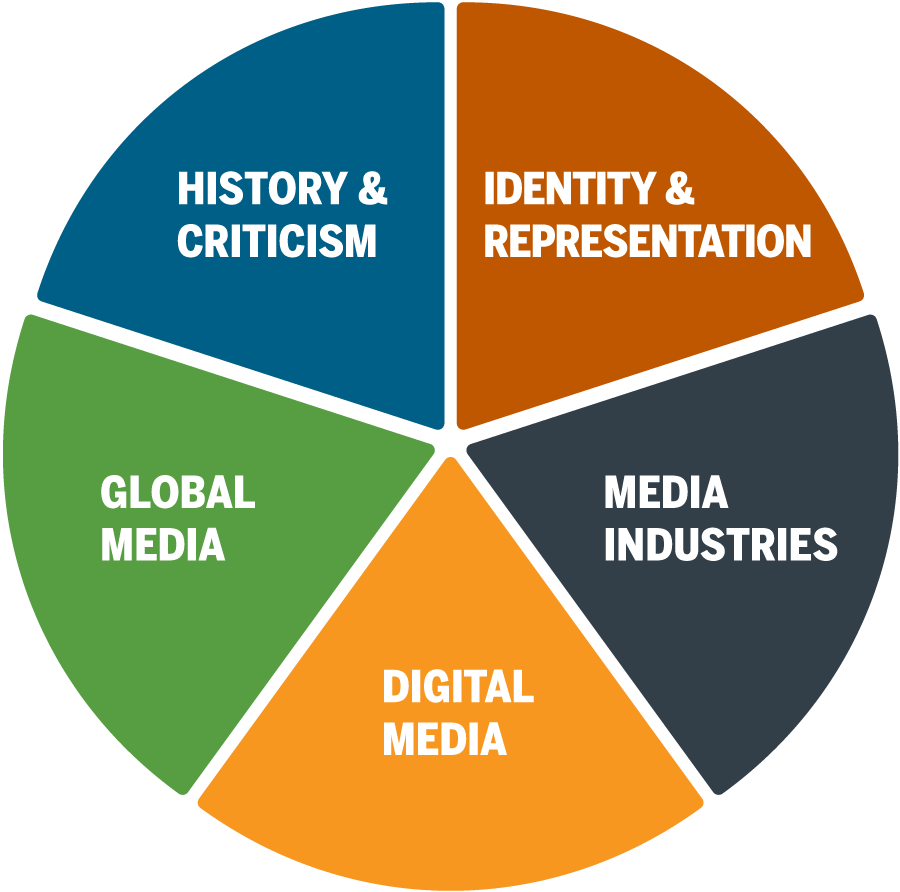
Digital Media
Analyze interactive and emergent media texts and platforms, participatory digital cultures, social media, and algorithmic culture.
Global Media
Study media texts, audiences, industries, and cultures from transnational, national, regional and diasporic perspectives.
History and Criticism
Examine the sociohistorical contexts of film and media and engage in aesthetic and critical analysis.
Identity and Representation
Explore media's impact on culture and identity through interdisciplinary courses that examine the politics of representation through gender, race, sexuality, citizenship, and more.
Media Industries
Engage in topics relating to creative labor, production, distribution, infrastructures, regulation, and exhibition.
Supporting Your Success
- Structured timeline for successful program completion
- Faculty mentorship
- Annual Review with detailed, constructive feedback
- High rate of success in job placement in the academy
- Pedagogy seminars and workshops
- Opportunities to teach stand-alone courses
- Internships with local media industry, festivals, policy institutions and cultural organizations
- Biannual professional development workshops
- Harry Ransom Center Film Research Collections
- Vast RTF resources at UT Libraries
- Editorial and organization roles for department-based journals
- Interdisciplinary and portfolio program options (in areas such as African and African Diaspora Studies, Women's and Gender Studies, and more)
Admissions Information
Meet our students, meet our faculty, see faculty books, program contacts.
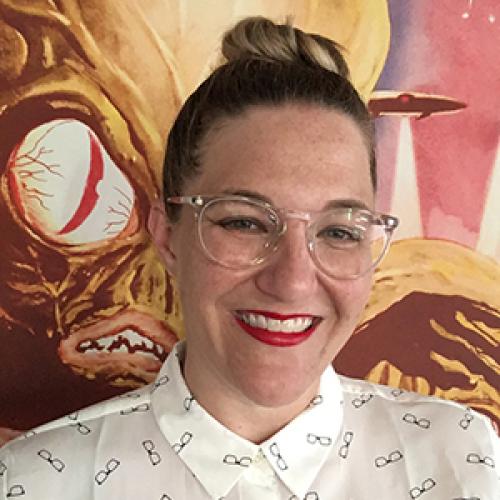
Area Head Media Studies
Suzanne Scott
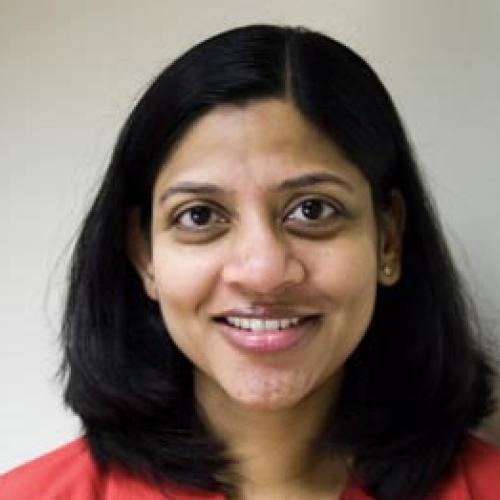
Graduate Advisor
Madhavi Mallapragada
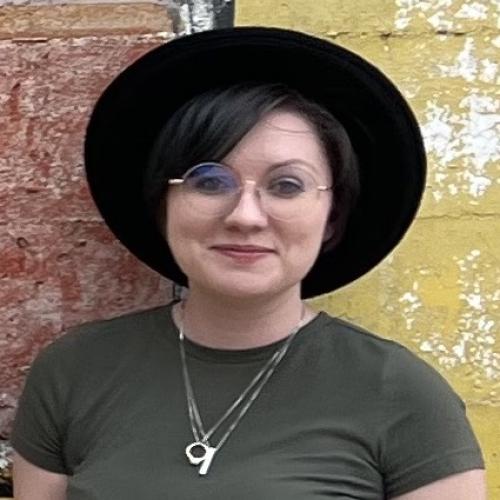
Graduate Coordinator
Teresa Warner
Email: [email protected] Phone: 512-471-4071
Skip to Content
- PhD: Media Studies
You are here
- Share via Twitter
- Share via Facebook
- Share via LinkedIn
- Share via E-mail
Fall Application Deadlines
US applicants: Jan. 15 International applicants: Dec. 1
In the online application, select Media Studies as the department, Media Research & Practice as the degree, and Media Studies as the subplan/track.
How to Apply
The PhD in Media Studies offered by the Department of Media Studies is one of three separate and distinct tracks of the Media Research and Practice doctoral program within the College of Media, Communication and Information.
Drawing largely from contemporary cultural and critical theory, the PhD in Media Studies focuses on interactions among the major components of modern communication — media institutions, their contents and messages, and their audiences or publics — as a process by which cultural meaning is generated. It examines that process on an interdisciplinary basis through social, economic, political, historical, legal/policy/regulatory and international perspectives, with a strong emphasis on issues involving new communication technology and policy.
As a graduate student and colleague in the Department of Media Studies you will be working within an environment that is committed to rigorous scholarship, critical pedagogy, and intellectual and creative engagement, one that celebrates traditional forms of intellectual inquiry and other equally-profound models and road maps of knowledge pursuit. Our commitment is to ensure that:
…you will emerge with a deep understanding of a range of theoretical paradigms drawn from social, cultural and media theory and a set of significant core competencies – intellectual, methodological, and creative.
…you will develop a sophisticated understanding of a range of quantitative and qualitative methodologies.
…you will use this experience to cultivate your intellectual and creative voice, one that is unique to you.
…you will have the opportunity to express that voice in a variety of ways, whether that be the traditional forms of intellectual expression, the book, the journal article, the conference paper or, where appropriate, employing the possibilities provided by emergent technologies and creative forms.
…you will understand the Department’s commitment to, and support of, engaged scholarship, our recognition that intellectual inquiry is also about intensifying synergies within and beyond the confines of the university, that the pursuit of knowledge is not an isolated affair, nor is it a privileged conversation, and that our scholarly labor is strong when it shortens the distance between academia and public life.
- Program Requirements
- Applications Guidelines and Resources
- Financial Support
- Contact Graduate Advising
Students take a minimum of 72 hours to complete their degrees, although they may take additional course work if there is a justified need. Students are expected to complete their course work and defend their dissertations in 4–5 years. Students may take up to 15 credit hours of course work outside the Department of Media Studies, through a required Outside Emphasis (9 hours), which complements the student’s plan of study, and through Advanced Methods in Media Research and Practice, (6 hours), which may include relevant courses offered either inside or outside of the department.
In general, course offerings toward the PhD in media studies emphasize the following cross-cutting themes that are treated throughout our curriculum:
- sophistication in the treatment of theoretical issues;
- rigor and high ethical standards in the collection, analysis and presentation of research;
- thorough knowledge of the historical context of media institutions and practices; and
- sustained focus on issues of social and cultural diversity (race, ethnicity, gender, class, sexualities), and on issues arising due to the increase in transnational media and information flows and influences.
Required Courses:
- Proseminar—6 (2 courses)
- Qualitative research methods—3
- Quantitative research methods—3
- Advanced research methods—3 hours
- One additional advanced methods course, or one media practice course—3 hours
- Inside emphasis—12-15 hours (4-5 Media Studies courses)
- Outside emphasis—9-12 hours (3-4 courses in other units)
- Dissertation hours—30 credits
Students are expected to complete the program and defend the dissertation in four-five years.
Applicants to the Media Studies track of the PhD program in Media Research and Practice are expected to hold the master’s degree or equivalent graduate work. In exceptional cases, applicants without a master’s degree may be considered for admission.
Completed domestic applications must be received by the program no later than Jan. 15 prior to the fall semester for which entrance is sought. International applications should be submitted by Dec. 1. Late applications may be considered under special circumstances.
Successful applications typically meet or exceed the following criteria:
Have an undergraduate cumulative grade-point average of at least 3.2 and a cumulative GPA of at least 3.5 in previous graduate work.
International applicants must have a TOEFL score of 625 (IBT 106).
Provide three letters of recommendation.
Provide a 700-word Statement of Purpose.
Provide a resume or CV that includes academic and employment experience.
Provide a writing sample that exhibits the ability to undertake the conceptual and empirical studies required of doctoral students (e.g., a chapter from a master’s thesis or graduate-level term paper).
Meeting these criteria does not guarantee acceptance into the program. Because we accept relatively few new doctoral students each fall, we may have more qualified applicants than available openings.
For review and decision purposes you are required to upload an unofficial copy of your transcript(s) in the online application. We require one copy of the scanned transcript from each undergraduate and graduate institution that you attended. This includes community colleges, summer sessions, and extension programs. While credits from one institution may appear on the transcript of a second institution, unofficial transcripts must be submitted from each institution, regardless of the length of attendance, and whether or not courses were completed. Failure to list and submit transcripts from all institutions previously attended is considered to be a violation of academic ethics and may result in the cancellation of your admission or dismissal from the university.
ONLY after you are recommended for admission will you need to provide official transcripts.
Instructions for Uploading Unofficial Transcripts to Your Application (scroll to 'Uploading Unofficial Transcripts in the Application')
FAQ | Online Application | International Students Online Application
Student Information
Be Involved
Helpful Links
Center For Environmental Journalism | Center for Media, Religion and Culture
Research or teaching assistantships, including a tuition waiver and stipend, as well as fellowships, are available. PhD students may receive assistantships for a maximum of four years.
Phone: 303-735-0730
Email: [email protected]
Campus Location: CASE W 361
MDST MDRP Program Handbook
Media Studies PhD Alumni
- Graduate Course Offerings
The following are Media Studies graduate courses. Not all courses are yet available. Please see an advisor if you have any questions.
- Core Courses
- Elective Courses
MDST 5000 (fall) Connected Media Practices—3 credit hours Helps students understand the evolution of film, television and gaming in the digital era. This course explores how screen media are created, circulated and consumed. Specifically referring to a multi-platform news and entertainment experience, connected media practices integrates digital technology and socially networked communication with traditional screen media practices. Prerequisites: Restricted to graduate students only. Required of students in Media and Public Engagement MA program.
MDST 5002 (spring) Media Activism and Public Engagement—3 Explores the theory on media activism and actual activist practices within both old and new media and on a local, national and global scale. Special attention will be paid to questions of creativity and efficacy and the value of media activism as both an aesthetic and political activity. Prerequisites: Restricted to graduate students only. Required of students in Media and Public Engagement MA program.
CMCI 6051 Theories of Mass Communication—3 Studies theories and perspectives of mass communication and explores the role of mass media in society. Prerequisites: Restricted to graduate students only. Required of students in Media and Public Engagement MA program.
MDST 7011 (fall) Proseminar in Media and Communication Theory 1—3 Introduces principal concepts, literature and theoretical and paradigmatic perspectives of media studies and mass communication and their ties and contributions to parallel domains in the social sciences and humanities. Prerequisites: Restricted to PhD students in Media Studies (MDST), Journalism (JRNL) and Advertising, Public Relations and Design (APRD).
MDST 7021(spring) Proseminar in Media and Communication Theory 2—3 Continues the introduction of principal concepts, literature and theoretical and paradigmatic perspectives of media studies and mass communication and their ties and contributions to parallel domains in the social sciences and humanities. Prerequisites: Requires a prerequisite course of MDST 7011 (minimum grade D-). Restricted to PhD students in Media Studies (MDST), Journalism (JRNL) and Advertising, Public Relations and Design (APRD).
CMCI 7051 (fall) Qualitative Research Methods in Media—3 Examines various methods of qualitative data gathering and analysis in the mass and social media context. Requisites: Restricted to graduate students only.
CMCI 7061 (spring) Quantitative Research Methods in Media—3 Examines various methods of quantitative data gathering methods and analysis in the mass media context. Requisites: Restricted to graduate students only.
MDST 5211 Asian Media and Culture—3 Offers an understanding of the various people, cultures and nations of East Asia through their media systems. Provides a critical overview of the historical, cultural, social, political and economic dimensions of East Asian communication systems in today's digitally connected/disconnected world. Same as MDST 4211. Prerequisites: Restricted to graduate students only.
MDST 5311 Mass Media Criticism Introduces the critical perspectives most often employed in qualitative media analysis: semiology, structuralism, Marxism, psychoanalytical criticism, sociological criticism. Texts from contemporary print and broadcast media.
MDST 5331 Gender, Race, Class and Sexuality in Popular Culture—3 Studies the construction, interconnections and replications of gender, race, class and sexuality in popular culture and how these constructs become cultural norms and mores. Uses critical methods with a focus on producing responsible viewers and readers. Same as MDST 4331. Prerequisites: Restricted to graduate students only.
MDST 6071 Critical Theories of Media and Culture—3 Introduction to critical theories and analysis of media and popular culture. Examines major theoretical traditions and/or theorists that significantly inform media studies (e.g., culturalism, structuralism, Marxism, critical theory, feminism, psychoanalysis, post-structuralism) and applies these to media analysis and criticism. Prerequisites: Restricted to graduate students only.
MDST 6201 Global Media and Culture—3 Covers mass communication within the international system, including similarities and differences in functions, facilities and content; social theories of the press; and the international flow of mass communication. Prerequisites: Restricted to graduate students only.
MDST 6211 Communication and International Development—3 Studies and analyzes communications technologies and techniques used in addressing social problems in developing countries. Prerequisites: Restricted to graduate students only.
MDST 6301 Communication, Media and Concepts of the Public—3 Introduces students to historical and contemporary uses of fundamental concepts in research and theory about media institutions, particularly public, community, mass, publicity, public space, public opinion, public interest and the public sphere. Prerequisites: Restricted to graduate students only.
MDST 6311 Power, Politics and Mediated Culture—3 Examines various literatures that consider the role of power in shaping social orders and the social beings that constitute that order and the place of media in both processes.
CMCI 6331 Political Communication—3 Explores the relationships involving media and politics. Incorporates normative and empirical perspectives on the media-politics complex. Areas covered include media effects on public opinion and policy, uses of media ingovernance, journalism sociology, coverage of elections and implications of interactive media for governance and civic participation. Requisites: Restricted to graduate students only.
MDST 6341 Children and the Media—3 Examines the concepts of children and childhood from the historical, social, cultural, economic and political perspectives, this course explores the interaction between mass media and the socialization and cultivation process of children and youth. Multiple theoretical traditions are used as a framework to study a variety of issues related to children and media. Prerequisites: Restricted to graduate students only.
MDST 6551 Media and Communication Policy—3 Surveys historical and contemporary developments in media and communications policy, emphasizing social and cultural dimensions. Prerequisites: Restricted to graduate students only.
MDST 6671 Media, Myth and Ritual—3 Anthropological and interpretative exploration of cultural practices of media audiences. Addresses theoretical and methodological implications of studying audiences from a culturalist perspective, with particular focus on media audience practices. Students engage in field research projects related to course content. Prerequisites: Restricted to graduate students only.
MDST 6711 Media and Popular Culture—3 Introduction to fundamental methods for understanding the construction of meaning in film, television, popular music and advertising. Traces the study of popular culture through film theory, mass media analysis and cultural studies. Surveys various strands of research that seek to understand popular culture and its effects. Prerequisites: Restricted to graduate students only.
MDST 6771 History of Media and Communication—3 Examines history and the history of communication, including the means (technologies) of communication, social practices (institutional, collective, individual) that intersect with the study of communication and media and cultural forms (texts, products). Situates the study of media, technology and culture within historical contexts, comparative historical research, media archaeology, genealogy and media history. Prerequisites: Restricted to graduate students only.
MDST 6781 Economic and Political Aspects of Media—3 Examines economic problems and political issues relevant to media institutions and industries. Prerequisites: Restricted to graduate students only.
CMCI 6861 Visual Communication—3 Visual communication involves understanding both perception of messages and construction of them. Students analyze their visual thinking abilities and develop habits of visual analysis and criticism, as well as visual communication skills. Requisites: Restricted to graduate students only.
MDST 6XXX Youth and Media Engagement—3 (course number to be determined) Young people today have unprecedented access to information and modes of media production, but how much of this access can translate into political and social engagement? What factors indicate youth involvement in media and participation in social and political processes. This course examines how youth engage media practices for greater civic participation. Restricted to graduate students only.
MDST 6XXX Practices of Social Mobilization—3 (course number to be determined) This course explores the role of mainstream and alternative media in the history of social advocacy, engagement and dissent. Through theoretical readings and case studies, the course provides an overview of the relationship between social movements and the media. Students learn theories and concepts of dissent, communication and social movements and develop critical analytical skills to apply to the analysis of specific cases. Case studies explore activist media across platforms (print, radio, broadcast, internet), contexts (from local to global, present-day to historical) and use (dialogic, contentious, hacktivist). Restricted to graduate students only.
MDST 6871 Special Topics—3 Variable topics. Restricted to graduate students only.
- Advertising, Public Relations and Media Design
- Communication
- Critical Media Practices
- Information Science
- Intermedia Art, Writing and Performance (PhD)
- BA: Media Studies
- Minor: Media Studies
- MA: Media and Public Engagement
- Mellon / ACLS Speaker Series
- CMCI Certificates
- CMCI Minors
- Communication & Society Residence Academic Program (CMCI CommRAP)
- CMCI in D.C.
- Graduation with Honors in CMCI
Apply Visit Donate
Thanks for your interest in CU Boulder’s College of Media, Communication and Information. We welcome your questions or comments and will respond as quickly as possible.

Ph.D. in Strategic Media
Learn More About The Program
Request information
By submitting contact information through this form, I agree that Liberty University and its affiliates may call and/or text me about its offerings by any phone number I have provided and may provide in the future, including any wireless number, using automated technology.
Message and data rates may apply. For additional information, text HELP to 49595 or 49596. You may opt-out at any time by sending STOP to 49595 or 49596. Visit for Terms & Conditions and Privacy Policy .

Become an Expert in Strategic Communications with a Ph.D. in Strategic Media
Today’s world is buzzing with digital conversation. From politics and religion to healthcare and human services, every industry is impacted by the media. By pursuing a Ph.D. in Strategic Media, you can learn how to utilize big data to grow your organization and your career. You’ll gain an understanding of the theory and applications behind effective communication problem-solving in the 21st century.
Imagine utilizing the latest trends in video, graphic, and online visual persuasion to take your organization to new levels. Pair that with the leadership and management skills you’ll cultivate in our Ph.D. in media studies, and you’ll walk away with a degree that helps you shape the direction of policies, goals, and objectives within the communication sector.
Liberty’s Ph.D. in media studies blends academic and professional courses. Through this online program, you can develop your knowledge of the current, trending practices in this rapidly evolving field. Your newly developed skills can be applied to many sectors, such as nonprofit, for-profit, and higher education, allowing you to bring fresh insight to your company. And with a degree taught from biblical principles, you can become a trusted, ethical voice in communication.
What Will You Learn in Our Ph.D. in Strategic Media Degree?
Your Ph.D. in media studies degree can provide the foundation in data-gathering and insight tools you need to effectively impact your field. With courses in interactive media design and strategic communications media analytics, you can become an expert in the communications field.
Overall, you will learn how to:
- Effectively use communication channels in the age of digital media
- Measure an audience to maximize the effectiveness of digital communication
- Conduct and interpret social, mobile, and online media analytics
Career Opportunities for Strategic Media Graduates
- Advertising/public relations executive
- Chief customer experience officer
- Communications executive
- Director of online sales and services
- Research manager
- Social media executive
- University administrator
- University professor
- Vice president of customer satisfaction
Benefits of Our Ph.D. in Media Studies Online
As a leader in distance education since 1985, we understand what it takes to create a flexible and affordable education for busy people. Since we have been investing in distance and online learning for decades, our experience has taught us how to streamline our degree options so you can focus on what really matters to you. While many schools offer online degrees, we believe Liberty stands out.
Here’s what sets us apart:
- We are recognized by multiple institutions for our academic quality, affordability, and accessibility . Our commitment to excellence also helped us rank in the top 10% of Niche.com’s best online schools in America . Earning your online strategic media degree from a nonprofit university with this kind of recognition can help set you apart from others in your field.
- Your success is our success, which is why we are committed to providing quality academics at an affordable tuition rate. While other colleges are increasing their tuition, we have frozen tuition rates for our undergraduate, graduate, and doctoral programs for the past 9 years – and counting.
- Our faculty members have years of real-world experience in the field of communication and invest in students both personally and professionally. You’ll learn practical skills from seasoned professionals to further your career.
Military Tuition Discount
We want to help you find the doctoral degree you want — at a price you’ve earned. As a thank-you for your military service, Liberty University offers eligible current and former service members like you or your spouse multiple pathways to earn a doctoral degree for only $300/credit hour . Here’s how:
- If you’re earning or have earned a master’s degree through Liberty, you automatically qualify for the low price (when you begin within 2 years of your master’s completion).
- If you haven’t earned a graduate degree through Liberty, our Executive Certificate program allows you to pay only $300/credit hour for a postgraduate certificate that can stand alone or potentially count as the first 21 hours of a related doctoral degree. Then pay just $300/credit hour for your doctorate. Learn more!
Credit Hours

100% online, 8-week courses
Interested in studying on campus?
Transfer Credits
Transfer in up to 50% of the degree total
Next Start Date
May 13, 2024
Accreditation
Liberty University is accredited by SACSCOC

“In the times in which we’re living today, Liberty University’s mission , the mission of training up a generation of Champions for Christ in literally every occupation, has never been more important .”
FORMER VICE PRESIDENT MIKE PENCE
Experience That Matters to You
As an accredited Christian college with a 7,000-acre campus in Lynchburg, Virginia, Liberty University offers you an education that is both academically challenging and rooted in a biblical worldview.
At Liberty, you’ll benefit from 35+ years of learning, growing, adapting, and innovating for the distance learner — and more than a decade of researching the needs of the online student. You can be confident that we’ve taken the time to learn what’s important to you.
And what’s that?
- Affordability
- Accessibility
- Academic Quality
These important factors challenged us to find new financial solutions, get ahead of industry trends, and blaze trails into cutting-edge career fields — and it’s paid off. That’s the difference experience makes.
Ranked in the top 10% of Niche.com’s best online schools in America and recognized by multiple institutions for academic quality, affordability, and accessibility.
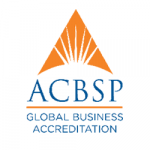
Why Choose Liberty University?
Enjoy flexible courses.
Choose from a wide variety of programs at the associate, bachelor’s, master’s, and doctoral level, most of which are 100% online*. With an 8-week format and 8 start dates per year, it’s easy to fit your courses around your schedule!
* Some exclusions apply. Please refer to our exclusions page for more information.
Maximize Your Time
Start and finish your degree faster! Liberty requires no standardized testing for admission, and you can transfer previous course credit — transfer in up to 75% of a bachelor’s degree and up to 50% of a master’s, postgraduate, or doctoral degree — or discover how your life, career, or military experience may count toward your college degree.
Grow in Your Faith
All of our courses are taught from a Christian perspective, and our faculty see themselves as mentors. Our mission is to Train Champions for Christ — we’re committed to championing you as you study to go further in your field, become a leader in your industry, or start a new career.
Access Academic Support
Throughout your educational journey, you will have access to academic resources that will aid in the completion of your degree. Services include our Jerry Falwell Library, writing center, tutoring, study aids, IT assistance, 30+ tutorial videos, live webinars, and personalized help from our academic advising team.
An Online Education with On-Campus Benefits

Cheer on 20 NCAA Division I games that air nationwide
Graduate with your peers

Be inspired by world-renowned speakers at Convocation
Why we’re nonprofit.
As a nonprofit (not-for-profit) university, Liberty is in the business of training skilled professionals to make a difference in the world – not gaining profit, revenue, or producing dividends for shareholders. In keeping with our commitment to your education, we invest our resources back into degree programs and into your student experience.
While many other online colleges have raised tuition, Liberty has been able to keep costs low as a nonprofit university and has not increased tuition for 9 straight years. Lower tuition means less student loan debt for students.
For Liberty University, nonprofit is more than a status; it is a valuable opportunity to invest in the lives of students who will go out and impact the world.
Request Information
Financing Options
Financial aid.
Nearly 80% of all Liberty students in an online program are awarded financial aid. Virginia residents may qualify for additional aid — learn more !
Corporate Tuition Assistance
Deferred – If your company reimburses you for the cost of your education, you pay only a portion of your balance up front. You submit your grades to your employer who pays you, and then you pay the remaining balance for your classes.
Tuition Discounts
Qualified military service members, veterans, and their spouses can receive up to 55% off their tuition rate for eligible programs!
Contact one of our Admissions Counselors for more information by calling (800) 424-9595 .
Apply FREE This Week*
*Some restrictions may occur for this promotion to apply. This promotion also excludes active faculty and staff, military, Non-Degree Seeking, DGIA, Continuing Education, WSB, and Certificates.

just applied for !

You are here
Ph.d. in film & digital media.

The Ph.D. program in Film and Digital Media challenges the traditionally conceived borders between creative and critical practice. The program enables potential dialogue between creative practice and theoretical knowledge as related forms of intellectual work and provides the conditions for students to realize a wide range of possible projects, including those that exist across the traditional divides of critical studies and production. Focusing on a diverse range of cultural production that includes cinema, television, video art, and Internet-based media, the Ph.D. program participants interrogate the historical, aesthetic, political, ideological, and technological aspects of these media forms across a range of international contexts, investigating their points of connection and convergence as well as their relationship to broader cultural and historical change. The program thus prepares students for intellectually informed creative practice as well as theoretical and critical production in a range of environments, not limited to traditional academic contexts.
Integrating critical and creative practice:
In our research and teaching, we explore the intersections of what have been, or have become, separated modes in our field of media studies: theory and practice. We seek to nurture dialogue between creative practice and scholarly inquiry as related forms of intellectual work.
Working across media:
Our approach to media studies and media production incorporates a range of technologies and platforms, stressing their historical and intertextual relationships.
Pursuing new modes of social and political engagement:
Media literacy, broadly defined, is an essential component of participation in our increasingly mediated lives. A new generation of media makers and media interpreters has the power to re-shape the world.
Fostering global cultural citizenship:
Making and studying media today necessitates a global and historical perspective. By thinking and working across boundaries of nation, culture and identity, we are creating new forms of knowledge and new media forms that respect and investigate differences of race, class, gender, sexuality and nation.
Film and Digital Media Ph.D. Program Learning Outcomes
Students who earn a Ph.D. in Film and Digital Media will gain the skills, knowledge, and understanding that will enable them to:
1. Demonstrate that student’s critical study of media informs the student’s media-making practices 2. Demonstrate knowledge of video and/or digital media production 3. Demonstrate critical thinking and analytical skills appropriate doctoral work in to the discipline of film and digital media 4. Demonstrate research skills appropriate to doctoral work in the discipline of film and digital media 5. Demonstrate scholarly writing skills appropriate to doctoral work in the discipline of film and digital media
Prospective Applicants:
Candidates must have demonstrated skill in critical, theoretical and historical scholarship, and a demonstrated interest in film, television, video and new media studies. We are particularly interested in candidates with demonstrated experience in some form of artistic production, and an interest in combining creative work with critical and theoretical study.
Candidates should also be aware that we will prioritize those who, in their application, outline a project or form of work that integrates critical and creative work together in a hybrid form that would be difficult or impossible to pursue in a either a conventional humanities program or a studio or production degree program. The Ph.D. program in Film & Digital Media is designed to provide a platform for the creation of hybrid work that would not be possible to accomplish elsewhere.
For program requirements, please review our Program Statement
For more information about UCSC applications, consult the Graduate Division website and their Admissions Pages.
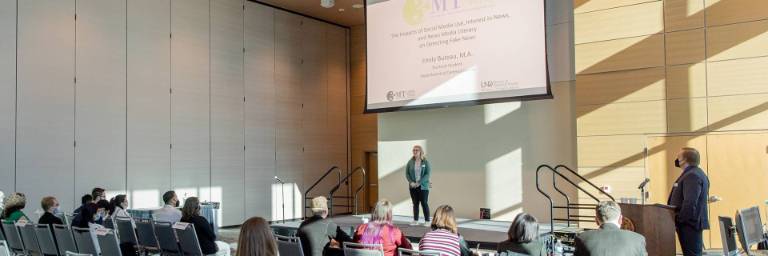
Communication Ph.D.
Study the different ways people communicate, so you can prepare for leadership roles across the globe.
Communication plays a fundamental role in our global society and it is imperative for us to recognize and appreciate the international and intercultural contexts in which it occurs. With a Ph.D. in Communication from UND, you'll learn about human communication across diverse cultures and through multiple systems.
Why earn a Ph.D. in communication?
*Priority deadline
If you're an international student, refer to the international application process for deadlines.
Understanding the different ways people communicate around the world will help you address socially and globally pressing communication challenges. The Communication Ph.D. at UND is a competitive program that provides you with knowledge and skills that will set you apart as a leader in international and intercultural communication.
Intensive Communication Research Ph.D. Program
Through both the on-campus and 100% online program tracks, you'll work hand-in-hand with research faculty recognized for their work in:
- Interpersonal and persuasive communication
- Risk and crisis communication
- New media and cyberculture
- Strategic communication in digital and social media environments
Online students must be enrolled full-time; on-campus students have the option of enrolling full-time or part time. This is to ensure adequate support for research initiatives.
Due to the research intensive nature of the program we encourage you to review our program's faculty profiles to learn more about individual faculty research interests and expertise. All students will be assigned a faculty advisor directly when conducting research.
Undergraduate to Ph.D. in Communication
Unique to our program, undergraduate students are allowed to apply directly to this Ph.D. program. If you have a bachelor's in Communication , our curriculum allows you to earn your master's in Communication at the same time you are working on a Ph.D.
UND's Communication Ph.D.
Learn from recognized leaders in the field of international and intercultural communication.
Develop your research interest in strategic communication, health communication, interpersonal and organizational communication, and much more.
Take part in graduate teaching assistantships. Positions available for students in both on-campus and 100% online tracks.
Earn a non-thesis master's degree on your way to completing your doctorate in our program.
S tudy closely with faculty across the broad range of communication areas to prepare for both careers and citizenship.
Understand how information processes and communication technologies affect and benefit diverse local and global communities.
Communication Ph.D. Careers
Projected growth for employment of post-secondary teachers from 2022 to 2032
U.S. Bureau of Labor Statistics
Median annual salary for post-secondary teachers
Upon completion of your Communication doctoral program, you'll emerge as a proficient communication specialist, equipped to excel in academia or thrive in media-related field.
Graduates of the University of North Dakota's Communications Ph.D. program have embarked on leadership roles in global and cross-cultural communication. The have job titles such as:
- Director of Communications: Spearheading communication strategies, our alumni often assume pivotal roles directing and shaping organizational messaging.
- Researcher: Equipped with advanced research skills, our graduates contribute valuable insights to the dynamic field of communication studies.
- Consultant: Our alumni serve as consultants, offering strategic guidance to organizations seeking to enhance their communication effectiveness.
- Policymaker: Some of our graduates leverage their communication acumen to influence policies. They participate in shaping regulations and standards on a local and global scale.
A substantial number of our graduates choose to contribute to higher education through teaching and advanced research. These paths have led them to roles such as:
- Department Head: Our alumni guide the direction of communication studies by taking on leadership positions within academic departments.
- Professorship: Achieving the pinnacle of academic success, our graduates secure professorships, where they shape the next generation of communication professionals.
- Associate Professorship: In roles as associate professors, our alumni engage in both teaching and research endeavors.
- Lecturer: Our graduates bring their practical experience and academic insights to the classroom.
Communication Ph.D. Courses
COMM 530. Communication, Society, & Diversity. 3 Credits.
An examination of how people from similar and different cultural, ethnic, national, racial, religious, and/or sexual backgrounds interact with each other, institutions, and society. The course covers issues of representation, identity, and difference. On demand.
COMM 525. Interpersonal Relations and Communication. 3 Credits.
Face-to-face and mediated transactions between two people or people in small groups in diverse settings. Deals with inquiry, conflict management, interpersonal sensitivity, individuality, and conformity.
COMM 535. Intercultural Communication. 3 Credits.
This course incorporates critical conceptualizations of identity, "the Other", and multiculturalism. It explores theoretical reflections of the symbolic systems of unfamiliar cultures, and the emergence of mutual understanding.
COMM 540. Communication and Organizations. 3 Credits.
Examines the general communication processes and dynamics within and among organizations and explores the dynamics in network organizations, with a particular focus on communication in interpersonal groups and inter-organizational working teams. Theories of power and politics in and among organizations, as well as of decision-making, conflict management, and strategic communication are explored.
COMM 550. International and Global Communication. 3 Credits.
An analysis of international media, comparative telecommunications systems and globalization. Covers issues such as transnational communication, global journalism, satellite broadcasting and communication in diplomacy and international affairs.
COMM 523. Social Network Analysis & Visualization. 3 Credits.
This course is designed to introduce you to the theory, methods, and procedures of network analysis with emphasis on applications to communication and social behavior. The goal of the course is to provide a working knowledge of the concepts and methods used to describe and analyze social networks so that you can apply it to important questions in your profession. S.
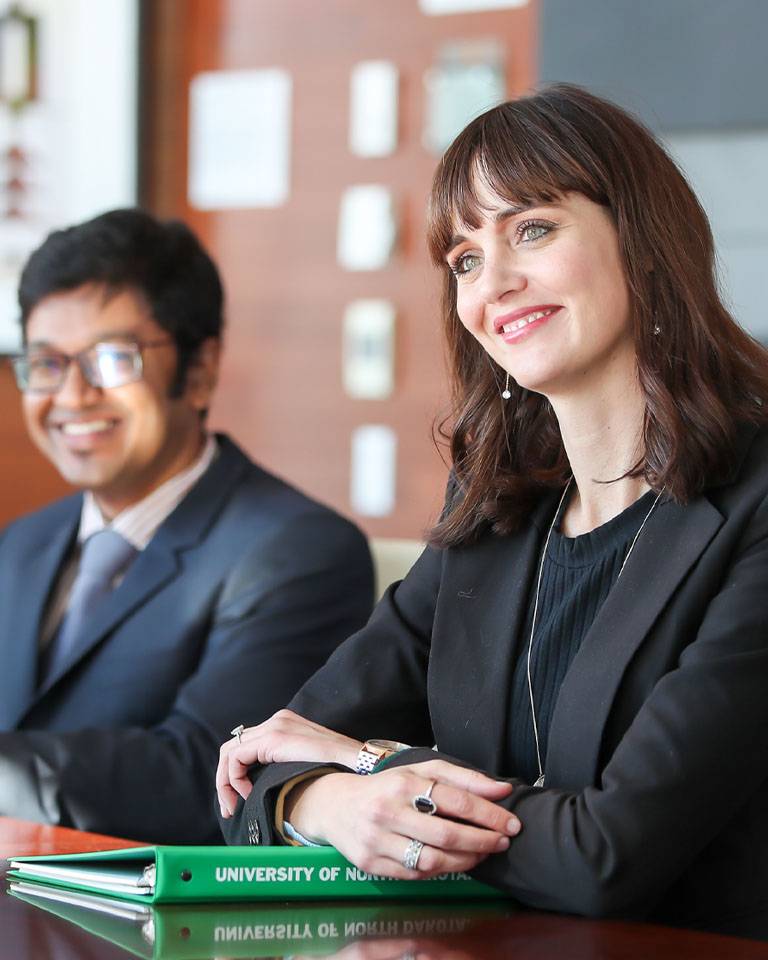
Best Ph.D. in Communications
UND's Communications Ph.D. ranks among the best for educational quality, affordability, and career outcomes.
#15 MOST AFFORDABLE ONLINE DEGREE
Online Communication Ph.D.
best online university in the nation
best online graduate programs
The entire degree program is fully online. You are never required to come to campus.
Online Communication Ph.D. students are highly encouraged to attend live, synchronous online courses in order to get the most out of class participation. However, online courses are recorded and can be viewed at another time, to fit your schedule.
Top-Tier Online Communication Ph.D. Program
Over a third of UND's student population is exclusively online; plus, more take a combination of online and on campus classes. You can feel reassured knowing you won't be alone in your online learning journey and you'll have resources and services tailored to your needs. No matter how you customize your online experience, you’ll get the same top-quality education as any other on campus student.
- Same degree: All online programs are fully accredited by the Higher Learning Commission (HLC) . Your transcript and diploma are exactly the same as our on-campus students.
- Same classes: You’ll take courses from UND professors, start and end the semesters at the same time and take the same classes as a student on campus.
- Real interaction: You can ask questions, get feedback and regularly connect with your professors, peers and professionals in the field.
- Your own academic advisor: As an invaluable go-to, they’re focused on you, your personal success and your future career.
- Free online tutoring: We're here to help you one-on-one at no cost. Plus, get access to a variety of self-help online study resources.
- Unlimited academic coaching: Need support to achieve your academic goals or feeling stumped by a tough course? We'll help with everything from stress and time management to improving your memory to achieve higher test scores.
- Full online access: Dig into virtual research from the Chester Fritz Library. Improve your writing skills with online help from the UND Writing Center. Get online access to career services, veteran and military services, financial services and more.
- 24/7 technical support: UND provides free computer, email and other technical support for all online students.
- Networking opportunities: Our significant online student population means you’ll have a large pool of peers to connect with. UND has numerous online events and activities to keep you connected.
Best Online College
Our high alumni salaries and job placement rates, with affordable online tuition rates make UND a best-value university for online education. UND's breadth of online programs rivals all other nonprofit universities in the Upper Midwest making UND one of the best online schools in the region.
UND ranks among the best online colleges in the nation for:
- Affordability
- Student satisfaction (retention rate)
- Academic quality (4-year graduate rate)
- Student outcomes (20-year return on investment per Payscale.com)
Leaders that Do
Students at UND take chances, seek challenges and become leaders in the community.
Check out the faculty you'll work with at UND or discover additional education opportunities.
- Department of Communication
- Find Similar Programs
By clicking any link on this page you are giving your consent for us to set cookies, Privacy Information .

Journalism and Media
Doctoral program.
Our doctoral program is among the best programs in journalism and media in the U.S. Led by faculty with distinguished research and publication records – many with professional journalism or media experience – our program is designed to equip students with a strong theoretical grounding and versatile research methods. Graduates of our four-year program can go on to positions in the academy, and they also may join think tanks, advocacy and non-governmental organizations and professional associations working with information and media systems.
We offer a far-reaching array of electives and research opportunities. The faculties’ fields of interest broadly include news and media engagement; online incivility; digital media; mis and disinformation; the digital divide and information equity; media law and policy, including the impact of Artificial Intelligence and algorithms on media; journalism and democracy; global media systems; media and representation; visual communication studies; critical data studies; social media and platform studies; media economics, among other topics. Please look at faculty bios and description of research opportunities to learn more about current projects.
Our program incorporates many opportunities to undertake research independently or to work with groups associated with research centers, institutes or research groups. We have an excellent record of participation with the major professional associations including the Association for Education in Journalism and Media Communication ( AEJ MC ), the International Communication Association ( ICA ), the International Association of Media and Communication Research ( IAMCR ), the Association of Internet Research ( AoIR ), as well as smaller highly focused forums such as The Research Conference on Communications, Information and Internet Policy.
Interdisciplinary Work
Our students also participate with the many interdisciplinary Portfolio Programs on campus. Moody College is home to three such programs, including the Communication, Information and Cultural Policy program focused on media systems, directed by some of our faculty. Additionally, summer internships with professional or research programs are sometimes sponsored by associated research institutes. Students have taken advantage of UT’s Archer Program , and the multi-University COMPASS program associated with the Technology and Information Policy Institute.
Program of Work 2023-2024
Doctoral Handbook 2023-2024
- Research Centers, Institutes and Programs
- Graduate Research
- Portfolio Programs
- Admissions Info
- Admissions FAQs
- Funding & Student Employment
- Texas One Stop
Email the JAM Grad Office
Explore your training options in 10 minutes Get Started
- Graduate Stories
- Partner Spotlights
- Bootcamp Prep
- Bootcamp Admissions
- University Bootcamps
- Coding Tools
- Software Engineering
- Web Development
- Data Science
- Tech Guides
- Tech Resources
- Career Advice
- Online Learning
- Internships
- Apprenticeships
- Tech Salaries
- Associate Degree
- Bachelor's Degree
- Master's Degree
- University Admissions
- Best Schools
- Certifications
- Bootcamp Financing
- Higher Ed Financing
- Scholarships
- Financial Aid
- Best Coding Bootcamps
- Best Online Bootcamps
- Best Web Design Bootcamps
- Best Data Science Bootcamps
- Best Technology Sales Bootcamps
- Best Data Analytics Bootcamps
- Best Cybersecurity Bootcamps
- Best Digital Marketing Bootcamps
- Los Angeles
- San Francisco
- Browse All Locations
- Digital Marketing
- Machine Learning
- See All Subjects
- Bootcamps 101
- Full-Stack Development
- Career Changes
- View all Career Discussions
- Mobile App Development
- Cybersecurity
- Product Management
- UX/UI Design
- What is a Coding Bootcamp?
- Are Coding Bootcamps Worth It?
- How to Choose a Coding Bootcamp
- Best Online Coding Bootcamps and Courses
- Best Free Bootcamps and Coding Training
- Coding Bootcamp vs. Community College
- Coding Bootcamp vs. Self-Learning
- Bootcamps vs. Certifications: Compared
- What Is a Coding Bootcamp Job Guarantee?
- How to Pay for Coding Bootcamp
- Ultimate Guide to Coding Bootcamp Loans
- Best Coding Bootcamp Scholarships and Grants
- Education Stipends for Coding Bootcamps
- Get Your Coding Bootcamp Sponsored by Your Employer
- GI Bill and Coding Bootcamps
- Tech Intevriews
- Our Enterprise Solution
- Connect With Us
- Publication
- Reskill America
- Partner With Us
- Resource Center
- Bachelor’s Degree
- Master’s Degree

Best Online Doctorates in Communication: Top PhD Programs, Career Paths, and Salary
The best online PhD in Communication offers you a flexible higher education path that will allow you to increase your earning potential and employability without having to step foot on campus. If getting your communication PhD online sounds appealing to you, read on to find out more about the top PhD programs in the country as well as the best communication jobs you can get after earning yours.
In this guide, you’ll get an in-depth look at how you can earn your doctorate without having to put the rest of your life on hold and a breakdown of the cost, admission requirements, and other details about each program. This article will help you with your school search by giving you a detailed look at the best online PhDs in Communication in the country.
Find your bootcamp match
Can you get a phd in communication online.
Yes, you can get a PhD in Communication online. There are several institutions that offer either fully online or hybrid PhD programs for students looking for a more flexible learning format. While there are some key differences between online and on-campus programs, both of these research-based degrees typically require the completion of the same number of credit hours.
Is an Online PhD Respected?
Yes, an online PhD is respected. Any PhD earned from an accredited institution is respected and holds the same weight no matter the learning format. Online classes are of the same quality as in-person classes and are optimized for distance learning. While on-campus students may have access to more physical resources, online programs take this limitation into consideration and compensate for it. Hence, online degrees are respected by many employers today.
What Is the Best Online PhD Program in Communication?
The best online PhD program in communication is the PhD in Media and Communication offered by Indiana State University, which provides a flexible learning method. Designed for part-time and full-time students, this program only takes three years to complete at most and offers its students plenty of hands-on experience through its online courses.
Why Indiana State University Has the Best Online PhD Program in Communication
Indiana State University has the best online communication PhD program because not only is it one of the most affordable doctoral programs on our list, but it’s also one of the most flexible, allowing students to adjust their course load to best accommodate their schedules. It is also the shortest of all doctoral programs on our list, even when taken part time.
Best Online Master’s Degrees
[query_class_embed] online-*subject-masters-degrees
Online PhD in Communication Admission Requirements
The admission requirements for an online PhD in Communication are different from one school to another. That being said, you’ll typically need to submit an online application form and provide your official transcripts from any institute you’ve previously attended, a scholarly writing sample, your resume, a list of references, your GRE test scores , and a personal statement.
- An online application form
- All of your postsecondary transcripts
- A writing sample
- Your current resume
- A list of references or reference letters
- A personal statement
- Your GRE scores
Best Online PhDs in Communication: Top Degree Program Details
Best online phds in communication: top university programs to get a phd in communication online.
The top university programs to get a PhD in Communication online are all terminal degrees, meaning that they are the highest level of education you can get in the field. These programs are designed to provide students with the skills and knowledge they need to achieve their career goals and earn a high annual wage after graduating. Here’s our list of the best online PhDs in Communication.
Boasting internationally-renowned faculty and being highly ranked among all schools and colleges across the country, American University is a research university that was established in 1893. Headquartered in Washington DC, The university offers flexible learning options across its various online programs specializing in numerous disciplines.
PhD in Communication
American University uses an interdisciplinary program to approach its coursework and offers its PhD students a highly-structured program that addresses political and social challenges. This three-year program teaches its students about the relationship between media, technology, and politics and how to analyze it critically.
PhD in Communication Overview
- Accreditation: Accreditation Service for International Schools, Colleges, and Universities
- Program Length: 3 years
- Acceptance Rate: Not specified, but only 5 applicants are admitted each year
- Tuition: $1,866/credit
PhD in Communication Admission Requirements
- Submit a completed online application form.
- Submit an admissions essay, two letters of recommendation, and your master’s thesis.
- Submit your GRE scores.
- Provide an updated resume.
- Provide your transcripts from all previous universities and colleges attended.
- Complete an interview if requested by the program director.
Indiana University of Pennsylvania (IUP) is a research institute that was established in 1875. The university offers over 140 undergraduate programs of study, 56 master's degree programs, and 14 doctoral degree programs. Prospective students at this accredited school can choose between an in-person program, an online program, and a hybrid program in most fields of study.
PhD in Media and Communication
The media and communication studies online program at IUP is flexible, teaching students the skills they need to be able to work in communication and training for the corporate space, health and political communication, media and management, and more. Prospective students wanting to enroll in this program can adjust their course load to fit their needs.
PhD in Media and Communication Overview
- Accreditation: Middle States Commission on Higher Education
- Program Length: Two to three years
- Acceptance Rate: 72%
- Tuition and Fees: $516/credit (in state); $593/credit (out of state)
PhD in Media and Communication Admission Requirements
- Create your admissions profile.
- Provide your official transcripts from all attended colleges and universities.
- Complete the online application.
- Upload your goal statement, two letters of recommendation, and a writing sample.
- Attend an interview if requested by the admissions faculty.
Established in 1972, Liberty University is a Christian, private, non-profit institution headquartered in Lynchburg, Virginia. Liberty University prides itself in providing a high-quality education at an affordable cost. One of the largest private universities in the country, Liberty University is currently home to almost 94,000 students.
The PhD in Communication degree program at Liberty University is delivered fully online. This 60-credit doctoral program in the study of communications focuses on qualitative research methods and theory, equipping you with the skills needed to become a leader in a variety of areas of business or become a researcher or a college professor.
- Accreditation: Southern Association of Colleges and Schools Commission on Colleges
- Acceptance Rate: N/A
- Tuition and Fees: $595/credit
- Fill out and submit your online application.
- Have a minimum college GPA of 3.0.
- Pay the $50 application fee.
- Submit your official transcripts of all previously attended postsecondary institutions.
Michigan State University (MSU) was founded in 1855 and is among the top research universities in the country. With over 200 academic programs offered at its East Lansing, Michigan campus, students can choose from a wide variety of specialties among its comprehensive doctorate programs. The communication programs offered at the institute are all highly ranked.
As early as 1961, the PhD in Communication at MSU has been recognized as being one of the most prestigious in the world. The structure of this graduate degree program focuses on communication theory, quantitative methods, and teamwork, allowing students to work in behavioral research, teaching, and communication consultancy or even specialize in hospitality research.
- Accreditation: Higher Learning Commission
- Program Length: 4 years
- Tuition and Fees: 817.25/credit (in state); 1,605.75/credit (out of state)
- Complete the online MSU Graduate School Application and pay the application fee.
- Provide a list of three referees and their email addresses.
- Submit an academic statement and a personal statement.
- Provide a copy of your resume.
- Submit a copy of your official transcripts to the Department of Communication PhD Program.
- Submit your GRE scores (optional).
Regent University was founded in 1978 and offers 60 programs for its online school graduate students to choose from. The institute has consistently ranked among the top national universities by US News & World Report. Prospective students can choose from a wide range of programs spanning many different fields of study at Regent University.
Regent University’s PhD in Communication is offered online alongside a one-week summer residency in Virginia Beach. This graduate degree takes an interdisciplinary approach to training, scholarly writing, and research and allows students to improve their communication and research skills . Common careers for graduates of this program include working as a writer, teacher, speaker, or thought leader.
- Program Length: 2-3 years
- Tuition and Fees: $950/credit
- Submit your application using the Regent University online application portal.
- Submit a minimum five-page scholarly or published writing sample that demonstrates your research, writing, analytical and problem-solving skills.
- Submit your unofficial college transcripts.
- Complete Regent University’s Academic Background Questionnaire.
- Provide a scanned copy of a government-issued ID.
Established in 1921, Robert Morris University (RMU) is a private institution that offers 60 bachelor's degree programs and 35 master's and doctoral programs. Home to approximately 4,100 students, most of which are undergraduate students, Robert Morris University’s doctoral degree in communication is one of the few PhD programs the school offers.
PhD in Information Systems and Communication
The PhD in Media and Communication at RMU is an executive-style doctor of philosophy program structured to give students the tools they need to become scholarly researchers and leaders. Through a blended learning format, the school uses an interdisciplinary approach to help students analyze the connections between technology and human communication.
PhD in Information Systems and Communication Overview
- Tuition and Fees: $1,207/credit
PhD in Information Systems and Communication Admission Requirements
- Have a master’s degree from an accredited institution with a minimum 3.0 GPA.
- Submit an online application.
- Submit your official transcripts of all undergraduate and graduate coursework.
- Provide three letters of reference and a current resume.
- Provide an academic writing sample.
- Complete an interview with the Doctoral Program Director and Doctoral Admissions Committee.
Founded in Lubbock, Texas, in 1923, Texas Tech University is a public research institution offering degree programs at the bachelor’s, master’s, and doctoral-level. Home to over 40,000 students, Texas Tech has produced a large number of notable alumni across a wide variety of fields of study.
Doctor of Philosophy in Technical Communication & Rhetoric
The PhD in Technical Communication & Rhetoric at Texas Tech allows students to develop their knowledge of rhetoric, writing, technical communication, and composition. Students can specialize in technical communication and user-centered design, rhetorical theory and practice, composition, writing, and literacy studies.
Doctor of Philosophy in Technical Communication & Rhetoric Overview
- Tuition and Fees: $8,653/year (in state); $16,180/year (out-of-state)
Doctor of Philosophy in Technical Communication & Rhetoric Admission Requirements
- Submit a graduate course paper or the equivalent that demonstrates your ability to develop a thesis using research and analysis.
- Submit a statement of purpose.
- Submit a copy of your resume, three letters of reference, and a signed copy of the Distance Learning Agreement.
Established in 1820, The University of Alabama has consistently produced award-winning graduates. These include sixty Goldwater Scholars, 16 Rhodes Scholars, 16 Truman Scholars, 37 Hollings Scholars, and 16 Boren Scholars. The school is well known for its programs in social sciences and business.
Doctorate in Communication and Information Sciences
The PhD in Communication & Information Sciences at The University of Alabama prepares students to work as library professionals and leaders in information environments. This online program has a curriculum that blends scholarly research and synchronous online courses to develop well-rounded graduates.
Doctorate in Communication and Information Sciences Overview
- Program Length: 2-4 years
- Tuition and Fees: $440/credit
Doctorate in Communication and Information Sciences Admission Requirements
- Have a Master’s Degree in Communications or in a related field with a minimum cumulative GPA of 3.0.
- Complete a graduate school application form and pay the application fee.
- Provide a statement of purpose and a copy of your resume.
- Provide the names and contact information for three academic references.
- Provide your unofficial college transcripts.
The University of Colorado Boulder was founded in 1876 and offers 124 master's, doctoral and professional degree programs. The institute is one of the country’s top-ranked Tier 1 research institutions and is one of only 35 public research institutions in the Association of American Universities (AAU).

"Career Karma entered my life when I needed it most and quickly helped me match with a bootcamp. Two months after graduating, I found my dream job that aligned with my values and goals in life!"
Venus, Software Engineer at Rockbot
PhD in Strategic Communication
This program’s coursework trains students in communication theory and research, as well as strategic communication research methods. The curriculum focuses on mass communication and public communication studies, literature and academic journals, social media trends , political communication, media organizations, and video games.
PhD in Strategic Communication Overview
- Program Length: 5 years
- Tuition and Fees: $866.29/credit
PhD in Strategic Communication Admission Requirements
- Have a master’s degree with a minimum graduate GPA of 3.5.
- Submit a personal statement, three letters of reference, and a scholarly writing sample.
- Submit an academic and professional resume.
- Provide the unofficial transcripts of all undergraduate and graduate courses you’ve taken.
Established in 1883, the University of North Dakota (UND) is a public research university recognized for leading research in engineering, medicine, aviation, space, and unmanned aircraft systems. The university also has the largest number of fully-online students among all universities in its region.
The PhD in Communication degree program at UND teaches students about the role of communication within the global community, as well as the international and intercultural contexts surrounding it. The curriculum focuses on critical thinking and the diverse nature of human communication across various cultures and systems.
- Program Length: 3-5 years
- Tuition and Fees: $660.08/credit
- Create an admissions account on the school portal.
- Submit an online application and pay the application fee.
- Submit your official transcripts and GRE scores.
- Submit a statement of interest detailing your personal goals and the relevance of the Doctor of Philosophy in Communication to those goals.
- Submit an original academic paper that shows your ability to articulate and synthesize ideas.
- Provide three letters of recommendation from sources familiar with your potential as a doctoral student in communication.
Online Communication PhD Graduation Rates: How Hard Is It to Complete an Online PhD Program in Communication?
It is somewhat hard to complete an online PhD program in communication. While the curricular content can be quite complex, most online programs are structured to be flexible, meaning that students can more easily take the time they need to learn what they’re being taught. Online PhDs require hard work, dedication, and motivation to complete even more than on-campus programs.
How Long Does It Take to Get a PhD in Communication Online?
It takes about two to five years to get a PhD in Communication online. The amount of time it takes you to complete your program depends heavily on whether you study part time or full time, if you have any transfer credits from other institutions, and the structure and curriculum of your chosen program. Most universities have a seven-year cap on their PhD programs.
How Hard Is an Online Doctorate in Communication?
An online doctorate in communication is not very hard to get if you are able to dedicate the time and effort required. A doctorate is the highest level of formal education that is available, meaning that it will be challenging, and while an online PhD may offer more flexibility, it doesn’t make the learning aspect of it any easier. Online programs only make it easier to fit other commitments into your life while pursuing your degree.
Best PhD Programs
[query_class_embed] phd-in-*subject
What Courses Are in an Online Communication PhD Program?
The courses in an online communication PhD program include Organizational Communication, Communication and Technology, Interpersonal Communication, and Health Communication, to name a few. Each program offers a different variety of introductory courses, advanced core courses, and elective courses.
Main Areas of Study in a Communication PhD Program
- Organizational communication
- Communication and technology
- Interpersonal communication
- Health communication
How Much Does Getting an Online Communication PhD Cost?
It costs $19,314 per year to get a PhD in Communication, on average, according to the National Center for Education Statistics. The actual cost of your degree is dependent on the institution you attend and whether it is private, public, or non-profit. Public universities typically cost the least to attend, and private and for-profit institutions will cost more.
How to Pay for an Online PhD Program in Communication
You can pay for an online PhD program in communication by either choosing from a selection of fully-funded doctoral programs, qualifying for a scholarship, applying for financial aid , or making an arrangement for a long-term pay-off plan. Many scholarships are offered through the research departments of some schools. Make sure to research what opportunities the school you’re interested in provides.
How to Get an Online PhD for Free
You cannot get an online PhDs for free. Online PhDs all require some form of payment. The only exception is those that offer full funding. Even then, this is done through an application and selection process, and not everyone qualifies for it. If you require financial aid, your best bet is to choose one of the aforementioned methods to reduce your financial burden.
What Is the Most Affordable Online PhD in Communication Degree Program?
The most affordable online PhD in Communication degree program is the PhD in Media and Communication offered by the Indiana University of Pennsylvania. This program will only cost you $319 per credit, making it much less expensive than the other programs on our list, which can cost up to $1,866 per credit.
Most Affordable Online PhD Programs in Communication: In Brief
Why you should get an online phd in communication.
You should get an online PhD in Communication because of the flexible and more convenient learning format it offers. Online programs give you the option to work or have time for other commitments such as your family. Online degree programs also tend to be less expensive than in-person degree programs.
Additionally, as previously mentioned, an online degree from an accredited institution is as valid as an in-person degree program. Having a PhD will increase your earning potential, allow you to work in a wider range of areas, and allow you to climb the corporate or institutional ladder more easily.
Top Reasons for Getting a PhD in Communication
- Career options. Because the knowledge and skills you’ve gained during your communication degree are useful and applicable in many industries, you’ll have a wider variety of options for career paths that you can pursue.
- Career outlook. The projected job growth for the common careers available to communication PhD grads indicates that, over the next decade, there is a good chance of finding employment upon completing your doctoral degree program.
- Higher-paying jobs . Since a PhD is the highest form of formal education you can get, that gives you a leg up when searching for employment opportunities. Employers generally seek out the most qualified candidates for the jobs they are offering. With a PhD, you will be among the most qualified and will be able to negotiate for a higher salary.
- Interest in expanding knowledge. Arguably, the best reason to get a PhD is the desire to learn more about an area you have a keen interest in. If you have the privilege of pursuing a degree in a topic you are passionate about, that in itself is reason enough to do it.
Best Master’s Degree Programs
[query_class_embed] *subject-masters-degrees
What Is the Difference Between an On-Campus Communication PhD and an Online PhD in Communication?
The difference between an on-campus communication PhD and an online PhD in Communication is the learning format and flexibility that an online degree program offers to its students and isn’t available to on-campus students. Whether you choose to get your PhD in Communication online or in person, the quality of the education you are receiving won’t change.
Online PhD vs On-Campus PhD: Key Differences
- Flexibility. The flexibility offered by online learning is perhaps the most notable difference between an online PhD and an on-campus PhD. Online programs are specifically designed for busy professionals and generally are more conducive to part-time enrollment.
- Cost. Typically, it costs less to enroll in an online degree program than it does to attend on-campus classes because distance learning students use fewer of the university’s resources. Additionally, when you factor in costs related to travel and supplies, the total expense of studying online tends to be significantly lower.
- College options. Another aspect of not having to travel to campus is that it opens up many more options when it comes to where you can choose to study. Not being limited by distance allows you to consider schools that you might have otherwise not been able to attend.
- Study locations. Whether you choose to study from home, in a library, or any other location, your learning environment is up to you. That being said, the benefit of studying on campus is that the formal environment often makes it easier to stay focused during your communication studies.
How to Get a PhD in Communication Online: A Step-by-Step Guide

To get a PhD in Communication online, you need to submit an application on the school website or portal, complete all of the required coursework set by the program, get your dissertation topic approved by the program’s faculty, pass all qualifying and comprehensive exams, and finally defend and submit your dissertation.
The first step to getting your communication PhD is applying. In most cases, you’ll need to fill out an application form with your personal details and the details of the degree you want to pursue and submit any additional materials to support your application. These usually include transcripts, a resume, and letters of recommendation, among others.
All doctoral students must complete a certain number of required courses throughout their PhD studies. The total number of courses you need to complete will differ from one institution to the next, but your academic advisor will be able to help you plan out your schedule in accordance with whether you are attending a program part time or full time.
At the same time as you work through your required courses, you will also need to present a dissertation topic that will be the focus of your PhD research. After its approval by your supervisor and the program director, you’ll be able to start your research. At multiple points during your research, you’ll need to demonstrate your progress to your supervisor.
To earn your doctoral degree in communication, you’ll need to pass qualifying and comprehensive exams. PhD faculty use these exams to ensure that their students are able to retain and use the knowledge they are gathering during their courses. Keep in mind that simply passing may not be enough. Most programs require that students maintain a minimum GPA throughout their studies.
The last thing you need to do to earn your PhD is to defend your dissertation in front of the program committee and director. If you succeed and have completed all of your coursework and maintained an acceptable GPA throughout your studies while staying in good academic standing, you will be able to apply for graduation.
Online PhD in Communication Salary and Job Outlook
The job outlook for online PhD in Communication holders from 2020 to 2030 looks promising. According to the US Bureau of Labor Statistics, media and communication occupations have a projected 14 percent growth . This is faster than the average projection for all occupations, which indicates that communication PhD graduates should not face many challenges in their job search.
What Can You Do With an Online Doctorate in Communication?
With an online doctorate in communication, you can explore various career paths, including sales management, technical writing, human resources management, and marketing management. In addition, you can also become a professor .
Best Jobs with a PhD in Communication
- Sales Manager
- Technical Writer
- Human Resources Manager
- Marketing Manager
- Postsecondary Teacher
Potential Careers With a Communication Degree
[query_class_embed] how-to-become-a-*profession
What Is the Average Salary for an Online PhD Holder in Communication?
The average salary for an online PhD holder in communication is $74,000 per year , according to PayScale. That means that you have the potential to earn a slightly higher salary than the average American employee’s salary . The actual amount you earn will depend heavily on your location, employer, job title, and experience.
Highest-Paying Communication Jobs for PhD Grads
Best communication jobs for online phd holders.
The best communication jobs for online PhD holders are all jobs that heavily utilize your understanding of how humans interact with one another as well as how factors such as technology and media affect this. In the following section, we break down some of the best jobs you can get with a PhD in Communication, including their salary, outlook, and the highest-paying states.
Marketing managers work in industries such as advertising, finance, healthcare, hospitality, education, and retail to execute strategies that raise consumer awareness. These strategies include promotional work that appeals to the consumers and maximizes profits and, ultimately, the company’s success.
- Salary with a Communication PhD: $133,380
- Job Outlook: 10% job growth from 2020 to 2030
- Number of Jobs: 316,800
- Highest-Paying States: New York, New Jersey, California, Delaware, Virginia
Human resources managers play an incredibly vital role in the proper functioning of any business. HR managers are tasked with hiring new employees and serving as the liaison between a company and its employees. HR managers are charged with the important responsibility of finding the best-suited candidates who will help push the company to new highs.
- Salary with a Communication PhD: $126,230
- Job Outlook: 9% job growth from 2020 to 2030
- Number of Jobs: 161,700
- Highest-Paying States: New York, New Jersey, District of Columbia, Massachusetts, Rhode Island
Postsecondary teachers, also called professors, teach students at universities and colleges, conduct research, and publish materials related to their field of study. You can choose to be a professor in any academic subject that is related to your PhD and teach at almost any academic level, depending on your level of experience.
- Salary with a Communication PhD: $79,640
- Job Outlook: 12% job growth from 2020 to 2030
- Number of Jobs: 1,276,900
- Highest-Paying States: California, Alaska, New York, District of Columbia, New Jersey
The job of a technical writer is to write academic journal articles, develop product manuals that teach people how to use products, write website help sections, and write about any other informational content that requires technical knowledge. Strong academic and corporate communication skills are vital for this position.
- Salary with a Communication PhD: $78,060
- Number of Jobs: 52,300
- Highest-Paying States: Delaware, California, Massachusetts, Hawaii, District of Columbia
Public relations specialists work for various types of organizations including schools and professional associations and are tasked with creating media releases, attending meetings and events, delivering speeches, and, generally, creating and maintaining a good public image for those they represent.
- Salary with a Communication PhD: $62,800
- Job Outlook: 11% job growth from 2020 to 2030
- Number of Jobs: 273,300
- Highest-Paying States: District of Columbia, Washington, New York, Virginia, California
Is It Worth It to Do a PhD in Communication Online?
Yes, it is worth it to do a PhD in Communication online if you wish to advance your knowledge and skills and work in the field of communications, retaining a significantly larger amount of flexibility than if you were enrolled in an in-person program. The variety of career options that this degree will offer you when you choose a career path is well worth the hard work.
A PhD in Communication will allow for quicker professional development when compared to the less advanced degree options within the field, allowing you to enter into higher and better-paying positions once you have graduated. With a PhD being a terminal degree in this field, you will have an incredible leg up over other candidates during your job search.
Additional Reading About Communication
[query_class_embed] https://careerkarma.com/blog/everything-about-communications-degree/ https://careerkarma.com/blog/communication-associate-degrees/ https://careerkarma.com/blog/best-online-communication-associate-degrees/
Online PhD in Communication FAQ
The most common specializations with a PhD in Communication include advanced communication theory, feminist studies, global communication, and cultural studies, to name a few. There are many specialization options you can choose from for your online PhD in Communication. In general, communications degrees can prove quite useful in different industries, so it is worth it pursuing a PhD in this field.
The degrees that you can get in communication include an associate degree , a bachelor’s degree, a master’s degree, as well as a PhD in Communication. The kind of degree you should get depends on your career goals.
Yes, there are associations and organizations you can join with careers in communication, such as the International Communication Association (ICA), the Public Relations Society of America (PRSA), and the Global Alliance for Public Relations and Communication Management (GAPRCM). There are several jobs for communication degree holders .
Yes, you can get an online PhD in Communication without a master’s degree. While not as common, you can apply for a PhD in Communication with only a bachelor’s degree at certain institutions. Make sure to check your desired program’s admission requirements to see if it’s a possibility for you and look at interesting communication topics you can research during your PhD.
About us: Career Karma is a platform designed to help job seekers find, research, and connect with job training programs to advance their careers. Learn about the CK publication .
What's Next?
Get matched with top bootcamps
Ask a question to our community, take our careers quiz.

Leave a Reply Cancel reply
Your email address will not be published. Required fields are marked *

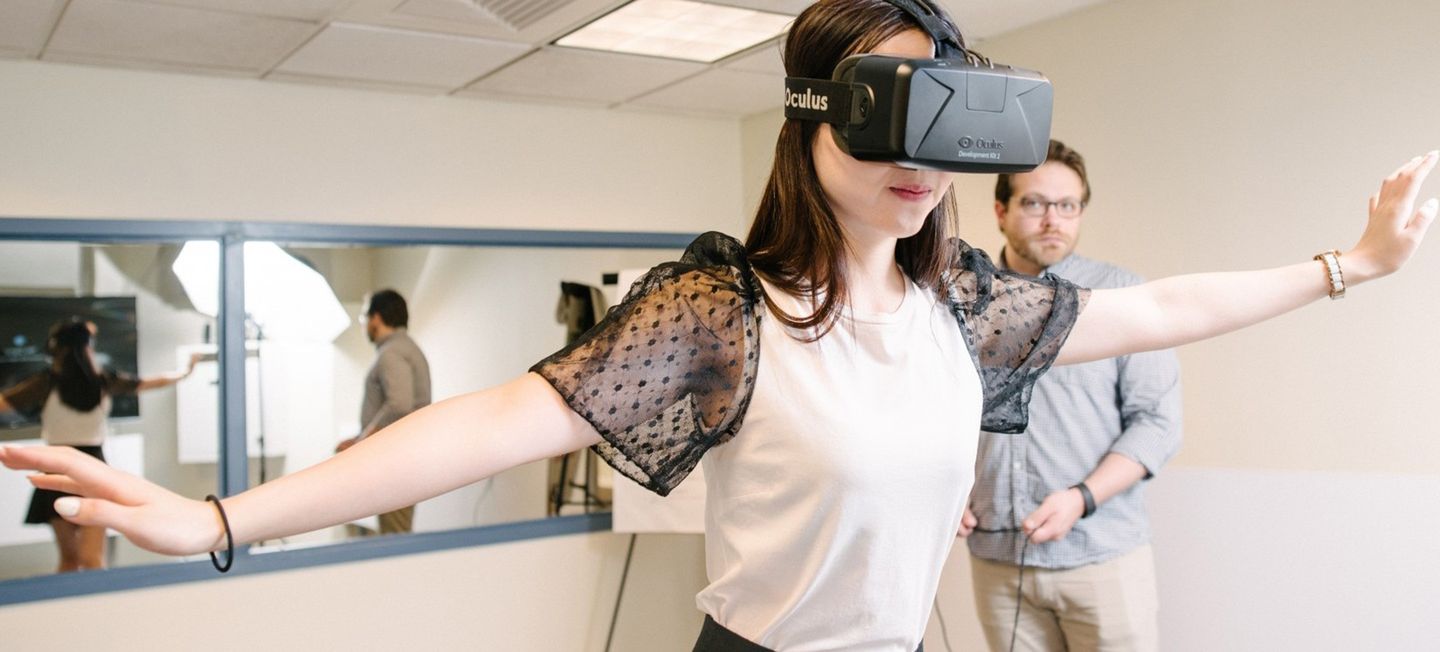
PhD in Emerging Media Studies
New media poses challenges for society and complexities for researchers. Are you ready to tackle both?
Academic Bulletin
- Degree Requirements
- Request Info
The Boston University PhD program in Emerging Media Studies is the nation’s first doctorate program in emerging media and its critical, daily role in modern life.
COM’s unique program prepares its doctoral students to become sophisticated researchers and critical thinkers who are ready to advance the fields of communication, sociological, and media leadership. Designed for students with a master’s degree, this program helps candidates gain a comprehensive understanding of the role of emerging media in society and organizations and hone their research skills through independent, innovative, and mentored research.
Recent and upcoming dissertation topics address a wide array of topics, such as social perceptions of robots, the effects of television binge-watching, and media framing of direct-to-consumer genetic testing.
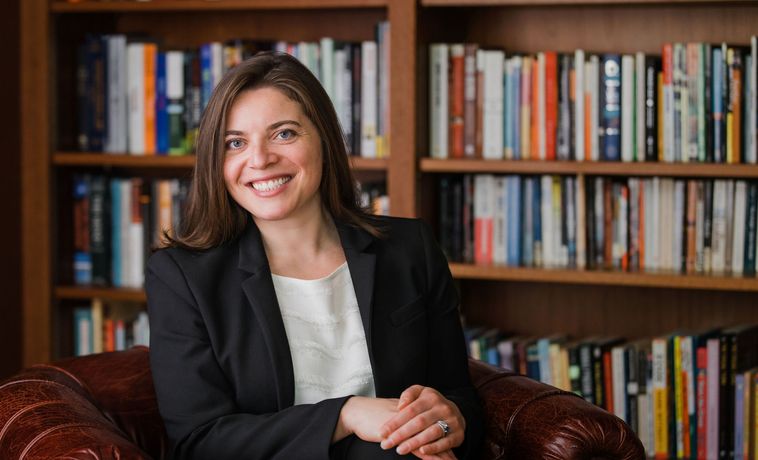
Meet COM’s First Doctoral Recipient, Sarah Krongard
It seems there’s always something to celebrate at COM, and the 2019 fall semester marked one particularly noteworthy achievement — PhD…
Learning and Teaching
EMS graduate students are taught and mentored by some of the leading researchers and thinkers in the field. The faculty make full use of the most advanced theories and methods to examine communication phenomena — from social media, streaming content, and AR/VR to Big Data and AI. Under their guidance, students learn how to conduct and analyze social science research concerning all types of emerging media.
As a doctoral student, you’ll serve as a teaching fellow while enrolled in the program. On average, you should expect to serve as a teaching fellow a minimum of two times during the program.
Resources for Research
COM graduate students get ready for careers by rolling up their sleeves for hands-on research.
All Emerging Media Studies students contribute to COM’s annual #ScreentimeBU conference, an opportunity to present their research in the field of digital communication and society as well as exchange their views with peers and field leaders concerning important contemporary issues. By showcasing the fruits of your research, you’ll share their ideas with the general public and industry leaders. Additionally, the conference provides an opportunity for you to develop your public communication capabilities and receive input from industry experts in a professional setting.
CENTER FOR MOBILE Communication Studies
Laptops, smart phones, and tablets have been transformed from novelties to necessities. But we’re only beginning to understand how they have transformed us.
EMS students also take advantage of research opportunities at COM’s Communication Research Center , COM’s primary research hub, and the state of-the-art technology offered at the Zimmerman Family Social Activation Center, that puts in-depth social media analytics at your fingertips.
Funding Support
Because the doctoral program is immersive and requires full-time participation for a number of years, all PhD students in Emerging Media Studies are funded for the duration of their study, up to a maximum of five years. Funding includes a full tuition scholarship, health insurance credit, and stipend in return for teaching and research obligations. Students with their own funding for the program (through the Fulbright Commission, government funding or other source) will still be required to serve as a teaching fellow for at least one semester. Compensation will be provided.
Benefit from Boston
One of BU’s greatest resources is its location. Consistently ranked among the most livable cities in the world, Boston is “America’s college town,” a city rich in history while remaining on the forefront of culture and innovation. Boston is a Top 10 U.S. media market, and home to some of the world’s best creative agencies, media companies and leading employers — offering boundless opportunities for internships and careers.
More than 80%
of our graduate students receive scholarships.
Purpose Driven
COM stands out from our peers. Our faculty offers a mix of researchers and practitioners who endorse a cross-discipline, hands-on approach to learning. Our location lies at the heart of an electric, media-savvy city.
But it may be COM’s shared values that matter most. We believe that communication requires diversity, critical thinking, and creative expression. We believe that communication must be grounded in truth, authenticity, effectiveness, and purpose. We believe that communication builds understanding among people and across society.
Emerging Media Research
The social contagion potential of pro-vaccine messages on black twitter.
Black Americans in the US not only suffered from disproportionately high hospitalization and death rates throughout the pandemic but also…
Excitation Transfer Across Displays of Different Immersive Quality
Full Title: Excitation Transfer Across Displays of Different Immersive Quality: Investigating the Temporal Dynamics of Intra-Stimulus Arousal Escalation and Decay.…
The Power of Personal Ontologies: Individual Traits Prevail Over Robot Traits…
This study examines facets of robot humanization, defined as how people think of robots as social and human-like entities through…
Effects of Congruity on the State of User Presence in Virtual…
The present study investigates how the user state of presence is affected by contingencies in the design of virtual environments.…
Meet the Emerging Media Faculty
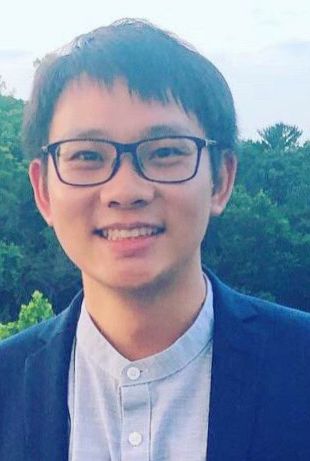
Chris Chao Su
Assistant professor, emerging media studies.
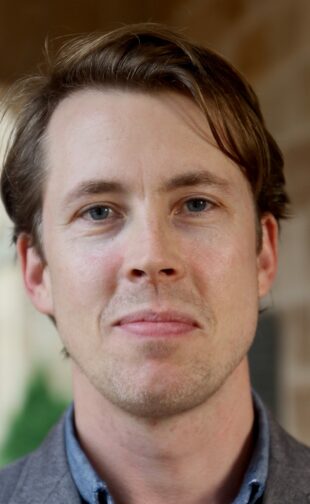
Chris Wells
Associate professor, emerging media studies.
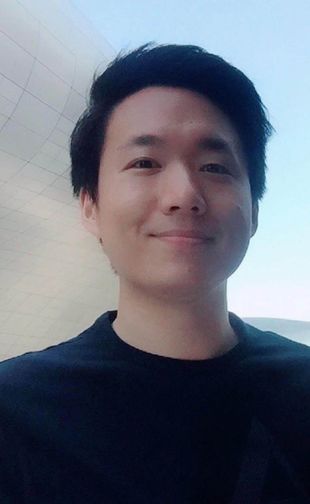
Daniel Park
Visiting assistant professor, emerging media studies.

Feld Professor of Emerging Media
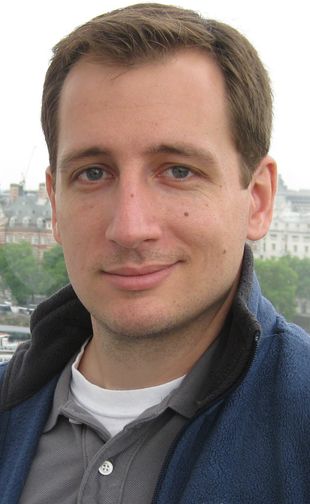
James Cummings
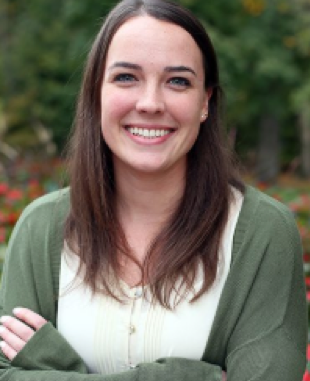
Kelsey Prena
Emerging media news, com’s new dalton professor knows disinformation from personal experience.
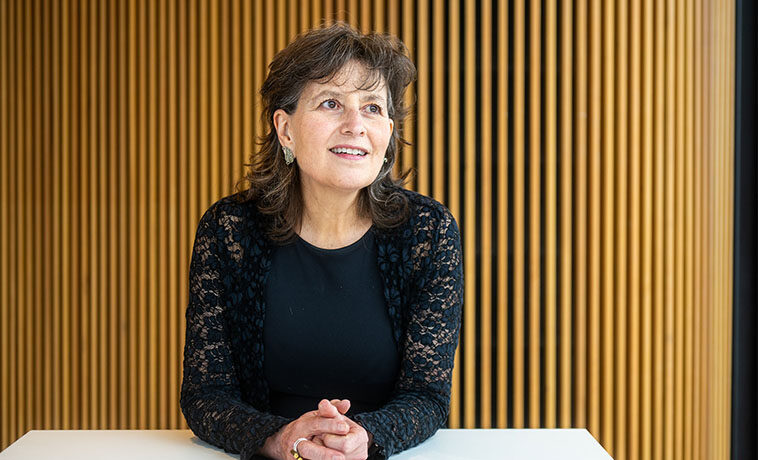
When Robots Deliver the News
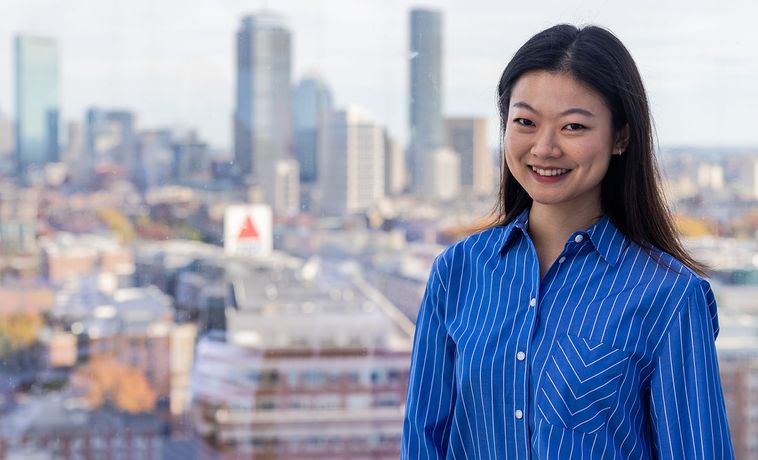
Joan Donovan, Nationally Recognized Expert in Misinformation and Disinformation, Joins COM Faculty
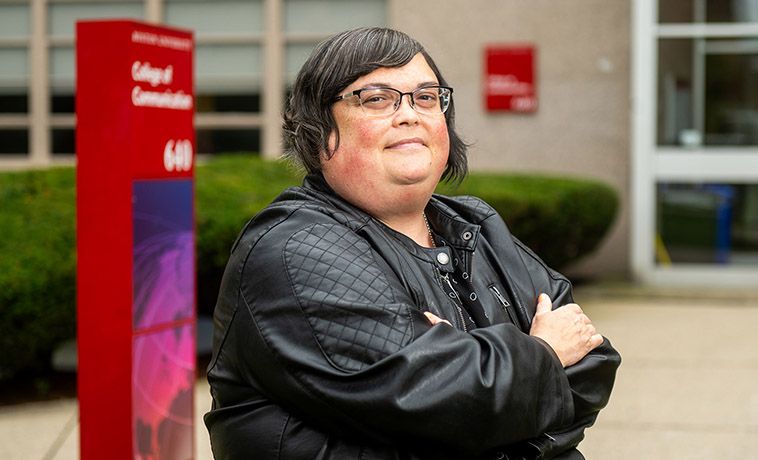
Emerging Media Studies

- Undergraduate
- Graduate Students
- Faculty and Student Resources
- McCormick Screening Room
- Media Editing Lab
- Undergraduate Library
- Film Production Equipment
- Film Festival
- Stay Connected
- Support Our Department

Welcome to the Film and Media Studies Ph.D. Program
UC Irvine’s PhD program in Film and Media Studies offers students the opportunity to study and develop original research on film, television, and digital media. Rooted in the Humanities, we focus on interpreting the histories and theories of media and their cultural contexts.
Our curriculum provides a broad foundation in Film and Media Studies while also centering questions of media and power. Our course offerings emphasize post-colonial and decolonial approaches to film and media, queer theory and histories of gender and sexuality, critical race studies, video game studies, and archival research. We seek students who are deeply invested in understanding the perspectives of those who have been pushed to the margins of media technology, industries, and texts and in exploring the relationships between culture, identity, history, and power.
Located near Los Angeles, UC Irvine offers access to the rich cultural offerings and research institutions of Southern California. Students may choose to supplement their Film and Media Studies degree with interdisciplinary graduate certificates in Asian American Studies , Chicano/Latino Studies , Critical Theory , Feminist Studies , Latin American Studies , and/or Visual Studies .
We admit all students, with BAs or MAs, directly into the PhD program in small cohorts with multi-year funding packages. We encourage prospective students to review our faculty profiles and contact the faculty members who work in their potential areas of interest before applying to learn more about their research, teaching, and advising.
Prospective students interested in the Ph.D. Program in Visual Studies, administered by the Department of Art History, can find more information here .
Meet the Film and Media Studies Faculty and learn about their research interests.
The annual admissions deadline is December 1 .
Complete applications will include:
• A Statement of Purpose (1200 words maximum) that describes your research interests and reasons for seeking a PhD. The Statement of Purpose should indicate how your proposed research correlates to our program's emphases and how you will benefit from working with specific core faculty. You can find information about faculty research interests here.
• A Personal History Statement (1200 word maximum) that describes your educational accomplishments and goals. It is important to communicate whether you have experienced unique or significant opportunities, challenges, and/or obstacles in your pursuit of an education. Please also describe the career paths you plan to pursue after graduation.
• A sample of academic writing that demonstrates original thinking, clear writing and your preparedness to do graduate-level work in film and media studies.
- Length: A minimum of ten pages to a maximum of thirty pages. Any submission longer than the maximum will not be reviewed past the maximum page limit.
- You may submit two pieces of work as long as their combined length does not exceed the page limit.
- In the event you have a longer piece of work to submit, such as a Master's thesis or Undergraduate research paper, please submit a chapter or section of the work within the page restriction.
• Three letters of recommendation, preferably from faculty with whom you have studied.
• Transcripts.
• Results of the TOEFL or IELTS exam for international applicants for whom English is not their primary language.
For academic questions (questions about program requirements, the application review process, funding opportunities, etc.) please contact the Graduate Director, Professor Kristen Hatch ([email protected]).
For administrative questions (questions about how to apply, paying the application fee, application materials, etc.) please contact the Graduate Coordinator, Amy Fujitani ([email protected]).
To apply, click here .
Course Requirements
Required Core Courses (6 courses)
FLM&MDA 285A: Film Studies: Theory and Methods.
FLM&MDA 285B: Television Studies: Theory and Methods.
FLM&MDA 285C: Digital Media and Game Studies: Theory and Methods.
FLM&MDA 286A: Film and Media Studies Historiography.
FLM&MDA 286B: Media/Power/Culture.
FLM&MDA 286C: Critical Approaches to Film and Media Studies.
Elective Courses (7 courses)
FLM&MDA 291: Graduate Seminar in Film and Media Studies. Repeatable as topics vary.
FLM&MDA 292: Graduate Seminar in Film & Media Critical Practice. Repeatable as topics vary.
FLM&MDA 295: Directed Reading. Repeatable as topics vary.
Required Practicums in Film and Media Studies (4 courses)
FLM&MDA 287: Practicum in Pedagogy.
FLM&MDA 288A: Practicum in Professionalization I.
FLM&MDA 288B: Practicum in Professionalization II.
FLM&MDA 288C: Practicum in Professionalization III.
Required Supporting Course (1 course)
FLM&MDA 298: Prospectus Writing Practicum.
Students must take three elective courses from within the Department of Film and Media Studies and two outside Film and Media Studies. The remaining two electives can be taken within or outside the department.
Students entering with a MA may petition to have up to three elective courses waived, subject to the approval of Graduate Division. Students who have had three courses waived must take two elective courses from within the Department of Film and Media Studies and one outside Film and Media Studies. The remaining elective can be taken within or outside the department.
During the third through sixth years in the program, students normally enroll in variable-unit courses as follows:
FLM&MDA 296: Reading for the Preliminary Examination.
FLM&MDA 297: Prospectus Research.
FLM&MDA 299: Dissertation Research.
First-Year Review
Students are required to select and confirm their Primary Advisor by the end of the first year.
At the end of the Spring quarter, the Film and Media Studies faculty will review the performance and progress of each first-year student and provide written evaluation of their work. This evaluation will include an assessment of the student’s ability to complete independent research.
A positive assessment indicates that the student is making good progress.
A cautionary assessment will be accompanied by a description of specific improvements that a student must make in order to advance to candidacy in the third year.
A negative overall assessment will place the student on Academic Conditional Status. Faculty will give written feedback with specific areas for improvement and a timeline for future expectations of academic progress. Students who fail to demonstrate improvement may be recommended for dismissal from the program without a degree.
MA Requirements
All students apply for and are accepted into the doctoral program.
Students who enter the PhD program with a prior graduate degree (MA or beyond) in Film and Media Studies or a related discipline may petition to waive up to three electives, subject to the approval of Graduate Division. These students may also petition to waive the MA exam requirement in recognition of their prior degree; normatively, this will be approved. In these cases, students will not complete the MA exam requirement nor earn a second MA en route to the PhD. Film and Media Studies faculty will determine what graduate degree fields qualify as related disciplines. Students entering with an MFA will typically be required to complete the MA exam unless the Graduate Committee determines that the degree is equivalent to an MA.
Students who have not earned an MA in a relevant field prior to matriculating in the Film and Media Studies PhD program must earn an MA degree as part of the PhD program. The program does not offer a stand-alone or terminal MA, except in instances when a student does not continue in the program toward earning the PhD.
In order to earn the MA degree, the student must
1. Satisfactorily complete six foundational courses (FLM&MDA 285A, FLM&MDA 285B, FLM&MDA 285C, FLM&MDA 286A, FLM&MDA 286B, and FLM&MDA 286C);
2. Satisfactorily compete FLM&MDA 287;
3. Satisfactorily complete seven electives, three of which must be within the Department of Film and Media Studies and two outside the Department of Film and Media Studies;
4. Pass the MA Exam; and
5. File the necessary paperwork for conferral of degree with Graduate Division.
For the MA exam, the student will revise one seminar paper written while in the program and submit the revised paper before the start of the Spring quarter in their second year of study.
The requirements for passing the MA exam are as follows:
• The revised paper must present a substantial and original argument;
• It must reflect substantive revision from the original paper, demonstrating additional research and/or reconceptualization and responsiveness to feedback;
• It must demonstrate a command of the relevant literature;
• It must present adequate evidence to support its claims;
• It must be clearly written in an appropriate academic style; and
• It must be formatted according to MLA or Chicago Manual of Style guidelines with proper citation and bibliography.
Ideally, this revised paper will demonstrate promise toward publication and toward the ability to develop a dissertation; however this is not a requirement at the MA stage.
This paper will be evaluated by a 3-person MA committee, which consists of the student’s primary advisor as chair and two additional department faculty members appointed by the Program Director in consultation with the student and the advisor. The MA committee will evaluate the student’s ability to identify a suitable research project and methodology, develop an argument, respond to faculty feedback, and make revisions. The committee will respond with feedback within three weeks of receiving the paper and may ask for a second round of reasonable revisions, to be completed before the end of the term.
The committee will unanimously decide whether the student has passed the MA exam and if they are eligible to proceed toward the PhD, taking into holistic account the exam (revised paper) results, input from the core Film and Media Studies faculty during the First-Year Review, and the student’s progress during the second year of course work. There are four possible determinations:
Positive: The student will earn the MA degree and qualifies to continue toward the PhD exams. This should be the outcome in the majority of cases.
Cautionary: The student will earn the MA degree and qualifies to continue toward the PhD exams but with areas for improvement communicated in writing to the student and advisor. This occurs when the student’s holistic performance and promise outweigh a borderline exam or vice versa. This should be the outcome only in rare or extenuating circumstances.
MA Only: The student will earn the MA degree but is disqualified from continuing toward the PhD exams. This occurs when the student’s holistic performance and promise do not outweigh a borderline exam.
Negative: The exam is unacceptable. The student will not earn the MA degree and is disqualified from continuing toward the PhD exams.
Students may revise and resubmit the MA paper one additional time in case of a failure to pass.
By the end of their second year, students will work with their advisor to plan their Examination fields for the following year. No later than the end of Winter in the third year of study, students will establish a 5-person Qualifying Exam Committee, at least 51% of whose members, including the Dissertation Advisor, must be core faculty in the Department of Film and Media Studies. At least one committee member must be external to the department.
The student will receive one standardized bibliography and select two specialty field bibliographies on which they will be examined. In the Fall and Winter quarters of the third year, the student will enroll in FLM&MDA 296: Reading for the Preliminary Examination and complete reading the works on these three bibliographies. The three exam areas should serve to help the student define general areas of specialized competence that will aid them in establishing a broad base for the dissertation and in developing college-level courses. Students may not enroll in FLM&MDA 296 until all their other course requirements (with the exception of FLM&MDA 298: Prospectus Writing Practicum) have been completed.
The Qualifying Examination will be administered by the Qualifying Exam Committee and will include both a written and an oral component. The written component will consist of at least one question for each Exam bibliography for which the student has completed readings. Students will write at least one essay for each respective Exam. Faculty may offer a range of questions for each bibliography, giving the student a choice of which question(s) to answer. The written component will be offered as a series of three remote exams to be completed within three respective 24-hour periods; questions and responses will be delivered electronically. The oral component of the exam will take place in conjunction with the Prospectus Defense during the Spring quarter of the student’s third year.
Language Requirement
Students will consult with the program Director and their principal advisor(s) to determine whether they must demonstrate or develop proficiency in a second language for their research. [1] If the program Director and principal advisor(s) determine that proficiency in a second language is required, the student must demonstrate this proficiency prior to advancing to candidacy. In the event a student does not need a second language to conduct doctoral research, they will not be required to demonstrate proficiency in a second language.
If determined to be required, the language requirement may be satisfied by one of the following means:
1. By passing the Film and Media Studies translation exam. A request must be made to the Film and Media Studies Staff within the first two weeks of the quarter the student wishes to take the exam.
2. By completing, with a grade of B or better, a language course at the 2C level or equivalent, with the exception of Arabic, Chinese, Japanese, and Korean, which must be completed at the 3C level or equivalent.
3. By attaining a proficiency level of 2C on the Russian Exemption Exam or a proficiency level of 3C on the Chinese Exemption Exam offered by UCI's Academic Testing Center.
4. By petitioning the program. Grounds for a petition might include the student’s being a native speaker in a language other than English or having completed an equivalent language requirement at a different institution. The granting of this petition will remain at the discretion of the Graduate Director, although students dissatisfied with this determination may request the petition be considered by the full faculty. Students who have completed the language requirement at a different institution will need to submit transcripts with the petition. Students will inquire with the Graduate Coordinator to complete a petition.
Dissertation Prospectus and Advancement to Ph.D. Candidacy
In the Spring of the student’s third year, the student will enroll in FLM&MDA 298: Prospectus Writing Practicum and complete a prospectus that identifies the scope, approach, and rationale for their proposed dissertation. The student will present an oral defense of the prospectus to the Qualifying Exam Committee. When the prospectus has been unanimously approved by the Qualifying Exam Committee, the student will be advanced to doctoral candidacy. Students should have taken their preliminary examination, defended their dissertation prospectus, and advanced to doctoral candidacy no later than the end of Spring quarter of their third year. If a student will exceed the 3-year normative time to candidacy, they must petition by Spring quarter of their third year for an exception, presenting an approved plan for timely progress to candidacy.
In the event that a student does not pass the qualifying examination, consistent with UCI policy (Academic Senate Regulation 467) the student will be allowed one repeat attempt of the examination. This repeat examination will occur during the quarter following the initial examination.
Dissertation
The dissertation shall be an original research project of substantial length approved by the Doctoral Committee. Members of the student’s Doctoral Committee are noted on the PhD Form I: Advancement to Candidacy PhD Degree. The committee shall typically consist of the Doctoral Advisor and two additional faculty. At least 51% of the Doctoral Committee, including the Doctoral Advisor, must be core faculty in the Department of Film and Media Studies. The remaining members of the Doctoral Committee must satisfy Academic Senate requirements.
Dissertation Defense
A final examination in the form of an oral defense of the dissertation is required for the PhD. This examination will be supervised by the Doctoral Committee and will be given just prior to the completion of the dissertation. The defense will be open to all members of the academic community. Faculty and graduate students of Film and Media Studies and the Graduate Dean will be given written notice of the date, time, and place of the examination at least five days in advance of the examination.
Time to Degree
The normative time to degree is six years (18 quarters). The first nine quarters are spent in pre-candidacy, the last 9 quarters in candidacy. Normatively, students will complete their course work within the first two years and prepare for and pass the Qualifying Examination and advance to candidacy in the third year. The maximum time to degree is seven years.
[1] Examples of when a second language would likely be necessary include Spanish proficiency for the study of Spanish-language media, Mandarin proficiency for study of media in Mainland China, or the relevant language for a project on non-English language transnational/diasporic media.
All students receive a five-year funding guarantee at admissions. This typically includes a combination of at least one fellowship year and multiple years of Teaching Assistantships. Additional competitive scholarships, fellowships, and summer stipends may also be available.
Students also receive tuition and fee remission, including non-resident (out-of-state or international) tuition during this period. Domestic students coming from outside of California will be expected to establish state residency during their first year; otherwise, they will need to cover their non-resident tuition fees.
TAships may be in Film and Media Studies undergraduate courses or for courses in other Departments or Programs.
Funding beyond the fifth year is not guaranteed, but TAships or other opportunities are often available.
The graduate emphasis in Film and Media Studies prepares students in any M.A., Ph.D., or M.F.A. program to analyze film and media texts, contexts, and industries. The emphasis requires that students complete four seminars, two of which are in the Film and Media Studies PhD core series (FMS 285A-C, FMS 286A-C) and two of which may be Film and Media Studies core or elective seminars (FMS 291, FMS 292, FMS 295).
Students who are currently enrolled in any MA, Ph.D., or M.F.A. program at UCI are eligible for admission to the Graduate Emphasis in Film and Media Studies.
Students who are interested in pursuing the graduate emphasis should contact the Graduate Director to indicate their interest in applying for the emphasis. Application materials include:
- an explanation of how their research and/or teaching will benefit from completing the Film and Media Studies Graduate Emphasis;
- current CV;
- brief letter of approval from the student’s primary advisor or program director;
- names of Film and Media Studies core faculty with whom they have worked or plan to work. Applicants who are not yet acquainted with Film and Media Studies core faculty may name the Graduate Director.
Application
To be considered for the Film and Media Studies Graduate Emphasis, please submit an application .
Questions? Please contact Amy Fujitani , Graduate Coordinator.
Contact Film and Media Studies
2000 Humanities Gateway Irvine, CA 92697
See the humanities in action
Copyright © 2023 UC Regents. All rights reserved.
Privacy Policy
Quick links
- Make a Gift
- Directories
Ph.D. in Cinema and Media Studies
Contact | Introduction | Admission Requirements | Application | Program Curriculum | Language Requirements | General Examination | Dissertation | Final Examination
Use the above links or scroll down for program information.
Students interested in applying for Autumn 2023, please read the following
Message from our director of graduate studies .
Director of Graduate Studies: James Tweedie ( [email protected] ) Graduate Program Advisor: Yuko Mera ( [email protected] )
Introduction
Our five-year Ph.D. program concentrates on scholarship and research as preparation for teaching at the university or college level in cinema and media studies. In addition, Ph.D. students will emerge with:
- ) an interdisciplinary understanding of the field from a humanistic perspective;
- ) the ability to assess and implement diverse pedagogical techniques;
- ) the ability to engage in primary research on a subject of their choosing;
- ) a sense of the role of cinema and media in national identity, globalization, and other forms of transnationalism;
- ) a familiarity with a range of historiographic practices in the field;
- ) an awareness of the importance of media technologies as objects;
- ) recognition of the crucial role of the aesthetic encounter; and
- ) advanced reading knowledge in at least one language other than English.
The faculty in the Department of Cinema and Media Studies have particular strengths in world cinema; silent-era film; documentary cinema; Chinese cinemas; South Asian cinemas; media technologies; television studies; new media; digital studies; race, gender, and media. For more information see our faculty list .
Admission Requirements
Master of Arts degree in Film Studies, Media Studies, or equivalent background.
Application
Click here for information on applying to the program.
Program Curriculum
(Enrolled students should consult the graduate student handbook for detailed policies and procedures.)
See chart below for expected progress through the program.
Course work
Ph.D. students in Cinema and Media Studies will be trained in the general methods and issues in the field, pedagogical techniques, as well as in various subfields of the discipline. Therefore, students are required to take CMS 525 Pedagogy and CMS 520 Methods and Approaches as well as three of the four core seminars: CMS 570 Media Lab, CMS 571 National Frameworks, CMS 572 Historiography, and CMS 573 Aesthetics. An additional 25 credits of graded coursework at the 500 level are also required.
Language Requirements
Advanced reading knowledge in one language other than English must be demonstrated before the end of the second year after entry into the program. Language competence is attested either by exams or by completion of satisfactory coursework in the language.
General Examination
The General Examination is normally taken in the Autumn quarter of the third year after enrollment. It consists of both a written and oral component, with emphasis on the latter.
Dissertation
Dissertation topics can be chosen from a broad range of areas with the field of cinema and media studies. Any member of the graduate faculty appointed in Cinema and Media Studies may supervise a dissertation.
Final Examination
Candidates must defend their dissertation via an oral examination administered by the dissertation committee.
Sample Progress Chart for the Ph.D.
- News Feed

Culture, Communication and Media MPhil/PhD
London, Bloomsbury
The MPhil/PhD programme provides a route for you carry out a piece of research that will make a distinctive contribution to knowledge in the fields of education, culture and communication. You will work closely with your supervisor(s) to develop your project, supported by a flexible programme of methodology courses and a strong research community of staff and doctoral students. This programme is available to study both face-to-face and online.
UK tuition fees (2024/25)
Overseas tuition fees (2024/25), programme starts, applications accepted.
- Entry requirements
The normal minimum requirement is a Master’s degree from a UK university in a subject appropriate to the programme to be followed, or a qualification of equivalent standard appropriate to the programme to be followed awarded by a university (or educational institution of university rank) outside the UK. The majority of our successful applicants hold a Merit at Master’s level, and may have additional relevant experience.
The English language level for this programme is: Level 4
UCL Pre-Master's and Pre-sessional English courses are for international students who are aiming to study for a postgraduate degree at UCL. The courses will develop your academic English and academic skills required to succeed at postgraduate level.
Further information can be found on our English language requirements page.
Equivalent qualifications
Country-specific information, including details of when UCL representatives are visiting your part of the world, can be obtained from the International Students website .
International applicants can find out the equivalent qualification for their country by selecting from the list below. Please note that the equivalency will correspond to the broad UK degree classification stated on this page (e.g. upper second-class). Where a specific overall percentage is required in the UK qualification, the international equivalency will be higher than that stated below. Please contact Graduate Admissions should you require further advice.
About this degree
The Department of Culture, Communication and Media has innovative, research-active staff able to supervise postgraduate research in the following areas: applied linguistics; TESOL; art, design and museology; music education; English education, social semiotics and multimodality; media education; learning with digital technologies; teacher professional development; and psychosocial studies. We have seven research centres: The Centre for Applied Linguistics, The Academic Writing Centre, The Confucius Institute for Schools, The International Centre for Intercultural Studies, Digital Arts Research in Education, The Centre for Multimodal Research and the UCL Knowledge Lab.
Who this course is for
The MPhil/PhD is for applicants with a strong interest in an aspect of educational and social research, which may be understood broadly across the life course, in relation to other subject areas and wider social, economic, political and cultural changes. You should normally have completed an MA to merit level and want to develop a specific area of research. You may have a background in education or a cognate area of study. It is suitable for both recent graduates and those progressed in a career.
What this course will give you
IOE, UCL’s Faculty of Education and Society is a world-leading centre for research in education and related social science. We host the UK's largest doctoral cohort in these areas. In the QS World University Rankings by Subject (2023), the Institute was ranked first for education for the tenth year running, ahead of Harvard, Stanford, Oxford and Cambridge. In the UK's recent Research Excellence Framework (2021), we were ranked first for research strength and research power in Education, according to the Elsevier REF 2021 Results Analysis Tool. We attract extensive research funding each year and host many prestigious research centres and projects.
Doctoral students at IOE have access to the wider UCL community as well as the education cluster constituting the ESRC UBEL Doctoral Training Partnership . The Institute's programme has been designed to provide comprehensive and broadly based research training and to meet the requirements of the Economic and Social Research Council (ESRC), the Arts and Humanities Research Council (AHRC) and the UK Researcher Development Framework.
Students work closely with their supervisor(s) to develop each stage of research; supervisors also help put together a programme of additional courses and activities to support progress towards completion of the final thesis.
The foundation of your career
Students will develop general and specialist skills in research methodology, academic writing and presentation, as well as gaining experience of engaging with a wide range of practitioners across different sectors of education.
UCL’s commitment clearly supports research like mine through bespoke, untested and uncommon approaches. This luxury is something not lost on me - it motivates me each and every day. David Ruttenberg Culture, Communication and Media MPhil/PhD Q&A with David Ruttenberg
Employability
IOE doctoral graduates in the Department of Culture, Communication and Media progress to careers in university teaching, educational research, policy and curriculum development, as well as creative arts education.
The Department of Culture, Communication and Media has a wide range of research seminars, where students can join discussion of our ongoing projects, as well as being the base for national and international conferences. There are also opportunities to work with education practitioners and organisations beyond IOE. The Centre for Doctoral Education holds two annual conferences for IOE doctoral students; and there are opportunities for students to offer specialist reading groups and workshops and to act as facilitators on courses within the research training programme.
Teaching and learning
In addition to UCL's Doctoral Skills Development Programme, IOE's Centre for Doctoral Education provides a comprehensive Research Training Programme.
The Core Courses aim to meets the needs of early stage doctoral students.
There is also a wide range of introductory, advanced methods, advanced theoretical, and generic academic skills courses, as well as student-led workshops and reading groups.
The Doctor of Philosophy (PhD) consists of a piece of supervised research, normally undertaken over a period of three years full-time or five years part-time. Assessment is by means of a thesis, which should demonstrate your capacity to pursue original research based upon a good understanding of the research techniques and concepts appropriate to the discipline. It must also represent a distinct and significant contribution to the subject, whether through the discovery of new knowledge, the connection of previously unrelated facts, the development of new theory, or the revision of older views. It should reflect the exercise of critical judgement with regard to both your own work and that of other scholars in the field.
For those who decide not to pursue the full PhD, or are unable to do so, the degree of Master of Philosophy (MPhil) consists of a piece of supervised research, normally undertaken over a period of three years full-time or five years part-time. Assessment is by means of a thesis, which should represent a contribution to the subject, either through a record of your original work or a critical and ordered exposition of existing knowledge.
You must ensure you have adequate time to devote to this research, at least six hours a day (2-3 days a week part time).
Research areas and structure
- Applied linguistics: bilingualism and multilingualism; neoliberal ideology and language teaching; materials analysis; English as a global language; language learning and identity; language teacher identity; language education, gender and sexuality; critical discourse analysis; second language acquisition; language testing; translanguaging; ethnography
- Art, design and museology: artists in sites of learning, curatorial practices and the shaping of knowledge in galleries and museums, artists interventions in educational contexts; visual culture
- Music education: musical development, the psychology of music, singing and voice science, music in special education, music ideology, gender and music, the sociology and philosophy of music, informal and popular music education, the wider benefits of music
- English education, social semiotics and multimodality: teacher identities; literature in urban classroom; social and digital literacy practices; identity, subject knowledge and communication; visual methodologies; subject knowledge and policy
- Media education: the moving image and video games; young people’s production of digital animation, film and computer games; online communities, virtual worlds, play and film
- Learning with digital technologies: software interventions to support learners with disabilities; the development of adaptive technologies; learner modelling; virtual learning environments; methods for analysing the effectiveness of interactive learning environments; technology mediated knowledge in the curriculum
- Psychosocial studies: reflexivity; psychoanalytically informed approaches to educational research; knowledge practices in the humanities and social sciences; unconscious aspects of learning, professional practice and research; post-structural theories of gender and subjectivity
Further details of staff research and publications are available on the department website.
Research environment
As a research student in the Department of Culture, Communication and Media, you can participate in the seminars organised by department research centres or according to interest groups.
Since October 2014, we have also – in addition to the campus-based mode - offered the option to study online in a distance-learning mode. Choosing the distance-learning mode means that there are no residency requirements and it is not necessary to attend during doctoral study, the viva examination take place in-person at UCL or online. However, you are welcome to visit and use campus facilities including the library, attend seminars etc. In the first year of full-time study (and first two years of part-time study), distance learners take a series of compulsory research methods modules that are studied online. This typically involves provision of materials (articles, eBooks, videos etc.), forums to facilitate discussion of various tasks, and synchronous sessions to discuss the activities. Alongside these you will work with your supervisors on your research (e.g., using Teams/Zoom and email). In addition, there are other resources and training opportunities to support distance-learning students, e.g., sessions to develop generic skills.
The length of registration for the research degree programmes is 3 years for full-time.
You are required to register initially for the MPhil degree with the expectation of transfer to PhD after successful completion of an upgrade viva 9-18 months after initial registration.
IOE Centre for Doctoral Education provides an extensive Research Training Programme. A mandatory core course is provided that aims to meet the needs of early-stage doctoral students. There is also a wide range of introductory, advanced methods, advanced theoretical, and generic non-credit bearing academic skills courses, as well as student led workshops and reading groups which you can attend.
Full-time MPhil/PhD students are required to fulfil minimum 20 ‘points’ of training activity in their first year, and are encouraged to fulfil the same in their subsequent years of study. This training can be selected from the UCL Doctoral Skills Development Programme, IOE faculty’s Research Training Programme, the multi-institutional Bloomsbury Postgraduate Skills Network, and from other sources. Each point is worth approximately a half-day of face-to-face training, or an online equivalent. Other activities such as attending and presenting at conferences also count towards research training. Students may undertake additional training beyond these minima, as relevant to their research and/or as agreed with their supervisors.
You are expected to upgrade from MPhil to PhD status towards the end of your first year of study if full-time. Students whose performance is satisfactory will transfer from MPhil to PhD status.
Processes aimed at assisting you during your course of study include the Research Student Log (an online project management tool), and periodic reviews of students’ progress.
Upon successful completion of your approved period of registration you may, if necessary, register as a register as a completing research status (CRS) student while you finish writing your thesis.
The length of registration for the research degree programmes is 5 years for part-time.
Part-time students are required to fulfil minimum 12 ‘points’ of training activity in each year of study. This training can be selected from the UCL Doctoral Skills Development Programme, IOE faculty’s Research Training Programme, the multi-institutional Bloomsbury Postgraduate Skills Network, and from other sources. Each point is worth approximately a half-day of face-to-face training, or an online equivalent. Other activities such as attending and presenting at conferences also count towards research training. Students may undertake additional training beyond these minima, as relevant to their research and/or as agreed with their supervisors.
You are expected to upgrade from MPhil to PhD status at around 18 months if part-time. Students whose performance is satisfactory will transfer from MPhil to PhD status.
Upon successful completion of your approved period of registration you may, if necessary, register as a completing research status (CRS) student while you finish writing your thesis.
Accessibility
Details of the accessibility of UCL buildings can be obtained from AccessAble accessable.co.uk . Further information can also be obtained from the UCL Student Support and Wellbeing team .
Where you'll study

The Department of Culture, Communication and Media is committed to excellence in research and teaching in the areas of Art, Design and Museology, Academic writing, English education, Applied Linguistics, Music Education, Learning with Digital Technologies and teacher professional development.
Fees and funding
Fees for this course.
The tuition fees shown are for the year indicated above. Fees for subsequent years may increase or otherwise vary. Where the programme is offered on a flexible/modular basis, fees are charged pro-rata to the appropriate full-time Master's fee taken in an academic session. Further information on fee status, fee increases and the fee schedule can be viewed on the UCL Students website: ucl.ac.uk/students/fees .
Additional costs
Students should take into account any travel, accommodation and expenses involved in their thesis.
For more information on additional costs for prospective students please go to our estimated cost of essential expenditure at Accommodation and living costs .
Funding your studies
For a comprehensive list of the funding opportunities available at UCL, including funding relevant to your nationality, please visit the Scholarships and Funding webpage: https://www.ucl.ac.uk/scholarships/funding-students-postgraduate-research-courses
UCL's Research Excellence Scholarships (RES) are available annually to prospective and existing UCL research students from any country: https://www.ucl.ac.uk/scholarships/research-excellence-scholarship . The UCL, Bloomsbury and East London Doctoral Training Partnership offers studentships annually. More information is found here: https://ubel-dtp.ac.uk/
UBEL, RES and other funding programmes are not available to online and non-resident students.
For a comprehensive list of the funding opportunities available at UCL, including funding relevant to your nationality, please visit the Scholarships and Funding website .
After choosing a programme to apply for, you should develop a research proposal and identify a potential supervisor. For more information, visit our website to find a supervisor and get in touch with departmental graduate tutors.
Please note that you may submit applications for a maximum of two graduate programmes (or one application for the Law LLM) in any application cycle.
Choose your programme
Please read the Application Guidance before proceeding with your application.
Year of entry: 2024-2025
Year of entry: 2023-2024, got questions get in touch.

Culture, Communication and Media
UCL is regulated by the Office for Students .
Prospective Students Graduate
- Graduate degrees
- Taught degrees
- Taught Degrees
- Applying for Graduate Taught Study at UCL
- Research degrees
- Research Degrees
- Funded Research Opportunities
- Doctoral School
- Funded Doctoral Training Programmes
- Applying for Graduate Research Study at UCL
- Teacher training
- Teacher Training
- Early Years PGCE programmes
- Primary PGCE programmes
- Secondary PGCE programmes
- Further Education PGCE programme
- How to apply
- The IOE approach
- Teacher training in the heart of London
- Why choose UCL?
- Entrepreneurship
- Inspiring facilities and resources
- Careers and employability
- Your global alumni community
- Your wellbeing
- Postgraduate Students' Association
- Your life in London
- Accommodation
- Funding your Master's
Thank you for visiting nature.com. You are using a browser version with limited support for CSS. To obtain the best experience, we recommend you use a more up to date browser (or turn off compatibility mode in Internet Explorer). In the meantime, to ensure continued support, we are displaying the site without styles and JavaScript.
- View all journals
- Explore content
- About the journal
- Publish with us
- Sign up for alerts
- CORRESPONDENCE
- 02 April 2024
How can we make PhD training fit for the modern world? Broaden its philosophical foundations
- Ganesh Alagarasan 0
Indian Institute of Science Education and Research, Tirupati, India.
You can also search for this author in PubMed Google Scholar
You have highlighted how PhD training assessment has stagnated, despite evolving educational methodologies (see Nature 613 , 414 (2023) and Nature 627 , 244; 2024 ). In particular, you note the mismatch between the current PhD journey and the multifaceted demands of modern research and societal challenges.
Access options
Access Nature and 54 other Nature Portfolio journals
Get Nature+, our best-value online-access subscription
24,99 € / 30 days
cancel any time
Subscribe to this journal
Receive 51 print issues and online access
185,98 € per year
only 3,65 € per issue
Rent or buy this article
Prices vary by article type
Prices may be subject to local taxes which are calculated during checkout
Nature 628 , 36 (2024)
doi: https://doi.org/10.1038/d41586-024-00969-x
Competing Interests
The author declares no competing interests.
Related Articles
See more letters to the editor
- Research management
- Scientific community

Ready or not, AI is coming to science education — and students have opinions
Career Feature 08 APR 24

After the genocide: what scientists are learning from Rwanda
News Feature 05 APR 24

The neuroscientist formerly known as Prince’s audio engineer
Career Feature 14 MAR 24
Brazil’s postgraduate funding model is about rectifying past inequalities
Correspondence 09 APR 24
Declining postdoc numbers threaten the future of US life science

How we landed job interviews for professorships straight out of our PhD programmes
Career Column 08 APR 24

How two PhD students overcame the odds to snag tenure-track jobs
Adopt universal standards for study adaptation to boost health, education and social-science research
Correspondence 02 APR 24
Equipment Service Technician
Memphis, Tennessee
St. Jude Children's Research Hospital (St. Jude)
Supv-Environmental Services
Biomedical technician, maintenance assistant - liquid nitrogen handling, building automation systems engineer (hvac and lighting).
Sign up for the Nature Briefing newsletter — what matters in science, free to your inbox daily.
Quick links
- Explore articles by subject
- Guide to authors
- Editorial policies
- University of La Verne News
- News and Events
University of La Verne Ranked Again for Best Graduate Programs
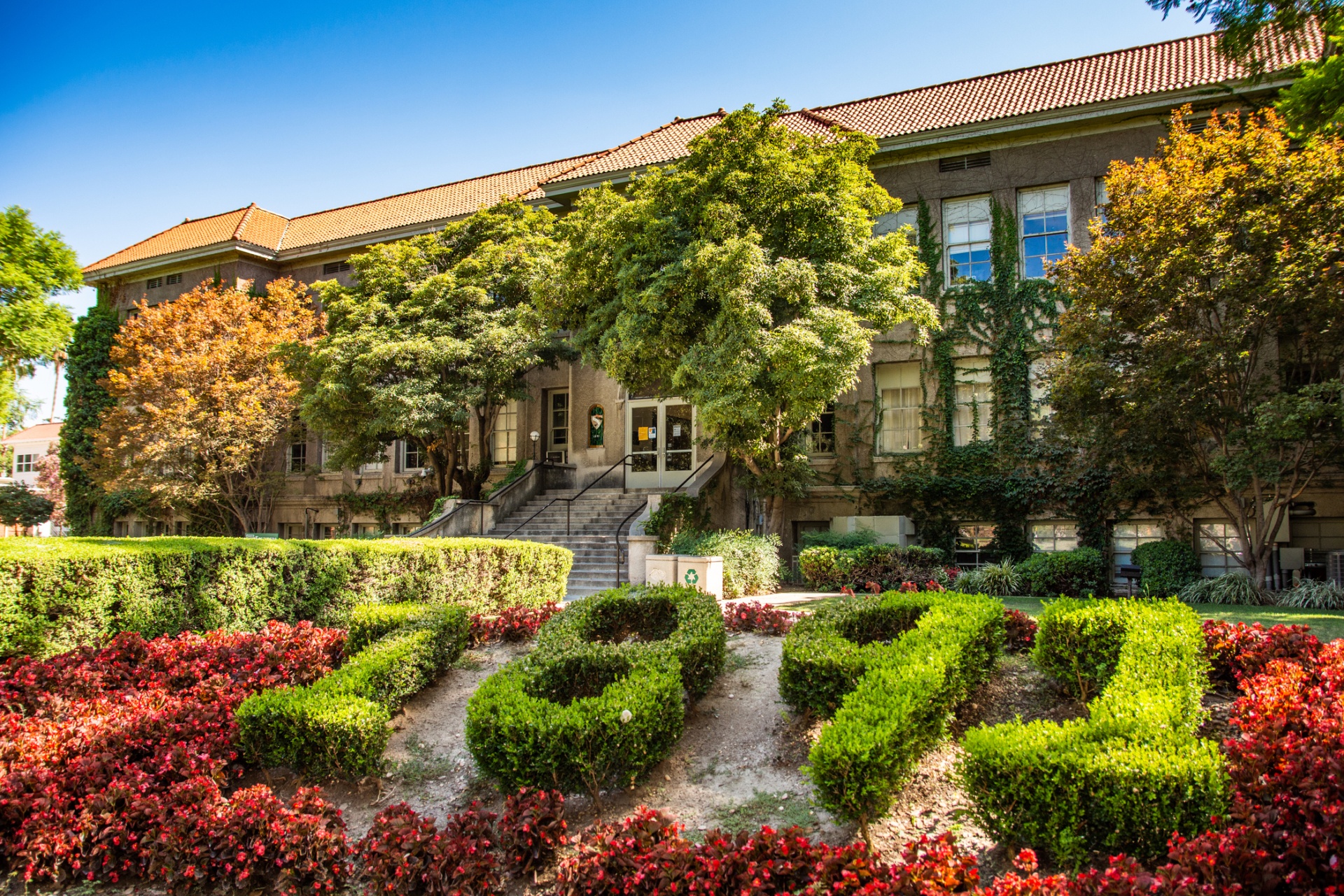
The University of La Verne’s education and public administration graduate programs are recognized again as the best in the nation, according to the U.S. News & World Report’s 2024 edition of Best Graduate Schools. The university has been consistently ranked in Best Education School and Best Public Affairs Program s listings.
Designed for prospective students looking to further their education beyond college, the Best Graduate Schools rankings evaluate programs based on current enrollment, job placement, faculty and other critical quality indicators that help prospective students make informed decisions.
This year, the university was one of only seven private California universities on the Best Education School list of 255 institutions nationwide. The University of La Verne LaFetra College of Education has been a leading i nstitution in preparing educators and leaders to address the challenges of today’s schools and rapidly changing organizations. It has received multiple state and national awards including most recently in the areas of continuing education and creative use of technology.
“We are deeply grateful to be acknowledged for our efforts to be a leader in educational equity, excellence, and innovation. Continually pioneering, we are expanding our adult and online degree programs and professional learning programs, utilizing innovative technology in our curriculum,” said LaFetra College Dean MD Haque. “We are proud of the education our students receive, with its emphasis on diversity, innovation, technology and research-based practices. Our professors are leaders in their fields who pride themselves on their quality programs, high standards, and dedication to students .” The college offers a variety of online and traditional graduate degree programs, in teaching preparation, leadership, educational counseling, school psychology, and child and adolescent development. The university recently formed a new partnership with AASA, the School Superintendents Association to expand professional development, introduce new programming, share resources, and provide a premier West Coast hub for AASA members and related activities supporting K-12 school district leaders nationwide. The University of La Verne, one of 317 institutions accredited by the globally recognized Network of Schools of Public Policy, Affairs, and Administration (NASPAA) Commission, offers both Master of Public Administration (MPA) and Doctor of Public Administration (DPA) degrees. This year marks the 50 th year for the MPA program, which offers degree specializations in urban management and affairs, nonprofit management, public health, and a JD/MPA dual degree program within the University of La Verne College of Law and Public Service. “As we reflect on our 50 years of programming, we are excited to continue to be recognized nationally and have an impact on building a better tomorrow by graduating outstanding students with the competency and passion for public service,” said Kevin Marshall, dean of the College of Law and Public Service. “We are particularly proud to be one of very few schools in California offering the opportunity for students to earn dual graduate degrees in law (JD) and public administration (MPA), giving them the competitive edge to be leaders in all public sector markets.” University of La Verne graduates have careers in local government, government agencies, and nonprofit organizations. According to recent graduating class reports, approximately 69 percent work in public sector positions across local, state, and federal agencies, 26 percent work in the nonprofit sector, and the rest work in the private sector. Other popular areas are nonprofit management and public policy.
Related Stories
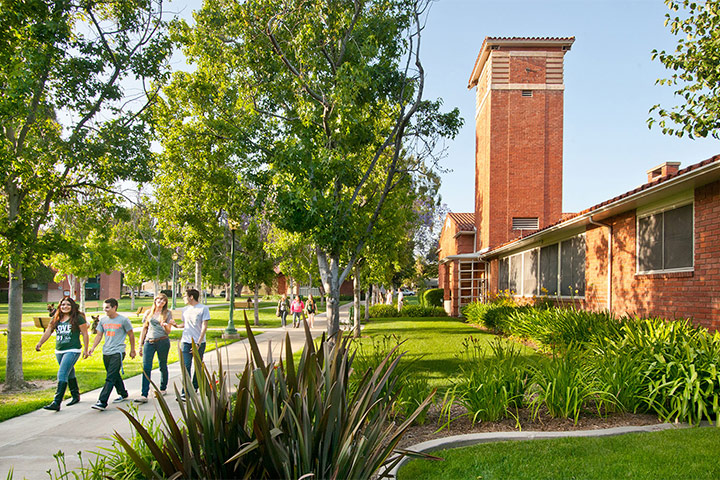
University of La Verne Online Programs Ranked Top in U.S. News & World Report
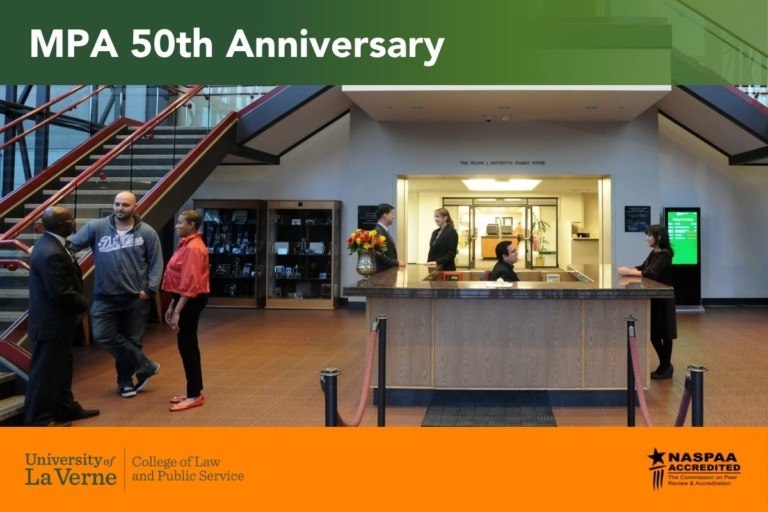
MPA Program Celebrates 50th Anniversary
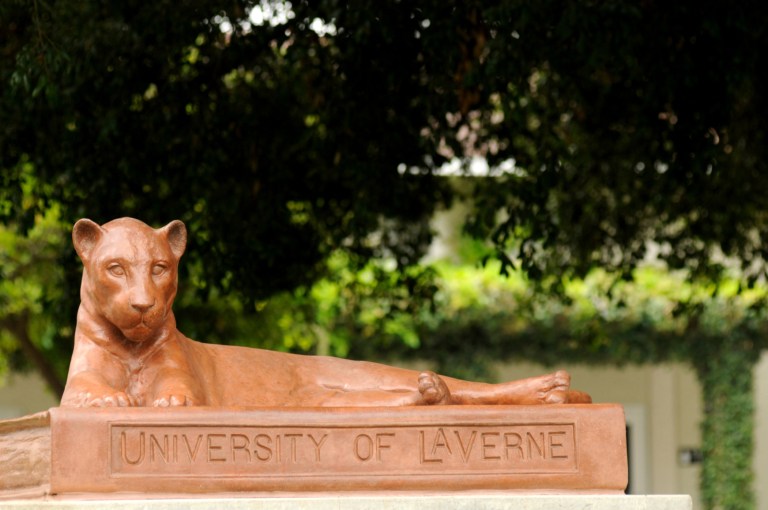
In the News: September Media Mentions
Search news, in the news.
University of La Verne faculty and programs are often highlighted in the media. Visit our collection of news stories below.
Media Contact
- Regional Campus
- University & Campus Life
- Career Paths
- Diversity, Equity, and Inclusion
- DMSE Job Opportunities
- Our Faculty
- Computing and Data Science
- Energy and the Environment
- Health and Medicine
- Manufacturing
- Transportation and Infrastructure
- Archaeological Materials
- Semiconductors
- Soft Matter
- Characterization
- Computation and Design
- Device Fabrication
- Synthesis and Processing
- Impact Stories
- Research Facilities
- Majors, Minors, and Concentration
- Opportunities For First-Year Students
- Opportunities for DMSE Undergraduates
- DMSE Breakerspace
- Wulff Lecture
- Application Assistance and Resources
- Doctoral Degree and Requirements
- Master’s Degree and Requirements
- Interdisciplinary Graduate Programs
- Funding Opportunities
- Postdoctoral Program
- MITx Online
- Newsletter Archive
- FORGE Initiative
QS World University Rankings rates MIT No. 1 in 11 subjects for 2024

QS World University Rankings has placed MIT in the No. 1 spot in 11 subject areas for 2024, the organization announced today. The Institute received a No. 1 ranking in the following QS subject areas: Chemical Engineering; Civil and Structural Engineering; Computer Science and Information Systems; Data Science and Artificial Intelligence; Electrical and Electronic Engineering; Linguistics; Materials Science; Mechanical, Aeronautical, and Manufacturing Engineering; Mathematics; Physics and Astronomy; and Statistics and Operational Research. MIT also placed second in five subject areas: Accounting and Finance; Architecture/Built Environment; Biological Sciences; Chemistry; and Economics and Econometrics. For 2024, universities were evaluated in 55 specific subjects and five broader subject areas. MIT was ranked No. 1 in the broader subject area of Engineering and Technology and No. 2 in Natural Sciences. Quacquarelli Symonds Limited subject rankings, published annually, are designed to help prospective students find the leading schools in their field of interest. Rankings are based on research quality and accomplishments, academic reputation, and graduate employment. MIT has been ranked as the No. 1 university in the world by QS World University Rankings for 12 straight years.
Ohio State nav bar
The Ohio State University
- BuckeyeLink
- Find People
- Search Ohio State

Republicans who support childhood vaccine mandates often stay silent
Study suggests social media is key contributor to self-censorship.
Most Republican voters support childhood vaccine mandates, yet may be discouraged from publicly expressing these views, a new study suggests.
To determine the source of this disconnect, researchers conducted a survey that revealed differences between Republican voters who support childhood vaccine mandates and those who do not.
According to the study, most Republicans surveyed supported immunization requirements for children and held favorable attitudes toward vaccine safety, while those who said they opposed vaccine mandates did not acknowledge this support exists – and expressed a greater willingness to share their vaccine views to others.
In contrast, the Republicans who supported vaccine mandates were largely aware that their views were in the majority, but tended to be less outspoken.

These results suggest that conservative supporters of childhood vaccination are not discouraged from speaking out because they assume that they are in the minority, but because external information environments, like social media, are sometimes dominated by minority views, said Graham Dixon , lead author of the study and an associate professor of communication at The Ohio State University.
“Those in the majority may simply sit out of the conversation because they see online environments as being dominated by extreme views and don’t want to engage in uncivil discourse,” said Dixon. “What’s significant is that those in the majority may self-silence even when they are aware of their majority status.”
The study was recently published in the journal Human Communication Research .
The work is especially notable because it corroborates recent research showing that much of social media content is driven by a minority of users who express more opinionated and politicized views than the typical user, said Dixon.
“Social media has become the new public square, so it’s concerning that the overrepresentation of atypical and sometimes extreme views may discourage people from participating in the conversation,” he said.
This overrepresentation, notes the study, can discourage those in the majority from speaking out because they fear that they may experience social conflict from doing so.
For example, when participants who supported immunization requirements were frequently exposed to anti-vaccine content on social media, they were more likely to believe that they would encounter conflict if they publicly voiced their support for vaccines.
This is likely a larger consequence of the online social environment, as social media can be used to amplify misleading information that represents the views of only a small subset of the population, said Dixon. In this case, such large-scale self-censorship could play a role in hindering public mobilization of important public health policies.
Researchers also found that the study’s results reveal more about majority misconceptions about a number of other issues, including how much support there is for climate change mitigation policies. For society to combat these issues, Dixon suggests that helping individuals build more self-confidence when engaging in online discourse and encouraging them to gain greater media literacy to navigate society’s fluctuating information environment could be better tools for overcoming self-silencing.
“We need to figure out ways of motivating people to engage in online discourse and to have the self-confidence necessary to be able to present their views,” he said. “Instead of telling them that their views are in the majority, efforts should be made to empower people’s self-confidence to participate in online discourse in civil and constructive ways.”
Other Ohio State co-authors include Blue Lerner and Samuel Bashian.
More Ohio State News
Visiting white parts of town make some black kids feel less safe.
Some Black youth feel less safe when they visit predominantly white areas of their city, a new study in Columbus has found.
Reflecting on the genocide in Rwanda 30 years later
In her years of studying the 1994 genocide in Rwanda and its aftermath, Hollie Nyseth Nzitatira has helped increase our understanding of how ordinary people can be coaxed into committing atrocities and how human resilience after genocide helps shape a nation’s future.
Ohio State graduate programs featured in new U.S. News & World Report rankings
Ohio State's graduate and professional programs continue to rank among the best in the nation and the state, according to the U.S. News & World Report 2024-25 edition of America’s Best Graduate Schools.

Contact: Admissions | Webmaster | Page maintained by University Communications
Request an alternate format of this page | Web Services Status | Nondiscrimination notice

COMMENTS
Indiana University of Pennsylvania offers a PhD in Media and Communication Studies. This is a flexible program designed for working professionals. Classes meet on weekends and use a blend of online and face-to-face components. Students may join either a full-time or part-time cohort. Full-time students take three classes per semester, and part ...
Drexel's MS and PhD level graduate programs in Digital Media are available for students and professionals who are interested in exploring, researching and building advanced media design and production careers. The programs reflect the fast-paced, constantly evolving field in which art, technology and science intersect and are based on an ...
Key Takeaways. A number of graduate schools offer an online PhD in communications. A communications PhD program is a good fit for students with an interest in linguistics, media studies, organizational communication, post-secondary education, and more.
Within our Ph.D. in Strategic Media, you will take courses in 4 major areas: advanced core, research, application, and dissertation courses. The advanced core courses are designed to help you ...
The PhD with concentration in Media Studies is a scholarly degree incorporating coursework, comprehensive exams, and research culminating in a dissertation. Students are expected to present their work at conferences and produce original work that is worthy of publication. Students admitted to this program must have already earned an M.A. degree.
The Doctor of Philosophy degree in Communications offers a multidisciplinary approach to the study of the relationships between people and media in their cultural, social, political, historical, economic and technological contexts. With the guidance of an interdisciplinary faculty advisory committee, students craft i ndividual courses of study ...
The PhD in Media Studies offered by the Department of Media Studies is one of three separate and distinct tracks of the Media Research and Practice doctoral program within the College of Media, Communication and Information. Drawing largely from contemporary cultural and critical theory, the PhD in Media Studies focuses on interactions among ...
From politics and religion to healthcare and human services, every industry is impacted by the media. By pursuing a Ph.D. in Strategic Media, you can learn how to utilize big data to grow your ...
2 years, 11 months. The Media and Cultural Studies PhD at Birmingham City University research degree will help you achieve a career in media research or academia. Your research will be delivered over three years (full time) or four years (part-time or distance learning). Ph.D. / Full-time, Part-time / Online, On Campus.
Students who earn a Ph.D. in Film and Digital Media will gain the skills, knowledge, and understanding that will enable them to: 1. Demonstrate that student's critical study of media informs the student's media-making practices. 2. Demonstrate knowledge of video and/or digital media production. 3.
2#. best online graduate programs. EDsmart. The entire degree program is fully online. You are never required to come to campus. Online Communication Ph.D. students are highly encouraged to attend live, synchronous online courses in order to get the most out of class participation.
Doctoral Program. Our doctoral program is among the best programs in journalism and media in the U.S. Led by faculty with distinguished research and publication records - many with professional journalism or media experience - our program is designed to equip students with a strong theoretical grounding and versatile research methods ...
The best online PhD program in communication is the PhD in Media and Communication offered by Indiana State University, which provides a flexible learning method. Designed for part-time and full-time students, this program only takes three years to complete at most and offers its students plenty of hands-on experience through its online courses.
The Boston University PhD program in Emerging Media Studies is the nation's first doctorate program in emerging media and its critical, daily role in modern life. COM's unique program prepares its doctoral students to become sophisticated researchers and critical thinkers who are ready to advance the fields of communication, sociological ...
The graduate emphasis in Film and Media Studies prepares students in any M.A., Ph.D., or M.F.A. program to analyze film and media texts, contexts, and industries. The emphasis requires that students complete four seminars, two of which are in the Film and Media Studies PhD core series (FMS 285A-C, FMS 286A-C) and two of which may be Film and ...
The Ph.D. program in Communication, Information, and Media provides doctoral training in theoretical and research skills for scholarly and professional leadership in the fields of communication, library and information science, and media studies.
Ph.D. students in Cinema and Media Studies will be trained in the general methods and issues in the field, pedagogical techniques, as well as in various subfields of the discipline. Therefore, students are required to take CMS 525 Pedagogy and CMS 520 Methods and Approaches as well as three of the four core seminars: CMS 570 Media Lab, CMS 571 ...
As a research student in the Department of Culture, Communication and Media, you can participate in the seminars organised by department research centres or according to interest groups. Since October 2014, we have also - in addition to the campus-based mode - offered the option to study online in a distance-learning mode.
Christopher Llewellyn Reed is Professor and Chair of the Department of Film and Moving Image at Stevenson University, and is a film critic, filmmaker and longtime educator. A brand-new member of the Washington DC Area Film Critics Association (WAFCA) and a Rotten Tomatoes-approved film critic, Chris is lead film critic at Hammer to Nail, an online magazine devoted to independent cinema; film ...
Per-credit tuition rates for the programs in our guide ranged from $442 to $950. A 60-credit degree from NU totals about $26,500, while the 66-credit option at Capitol Tech costs more than $62,000 ...
graduate programs. 2. Read the Doctoral Degree section of the Department of Electrical and Computer Engineering Graduate Program Guidelines. 3. Appoint a major professor with the College of Graduate Studies. 4. Complete and file an approved study plan with the Registrar within the first two semesters.
02 April 2024. How can we make PhD training fit for the modern world? Broaden its philosophical foundations. By. Ganesh Alagarasan. You have highlighted how PhD training assessment has stagnated ...
The University of La Verne's education and public administration graduate programs are recognized again as the best in the nation, according to the U.S. News & World Report's 2024 edition of Best Graduate Schools. The university has been consistently ranked in Best Education School and Best Public Affairs Programs listings.
Apr 03, 2024. OLLU's online PhD program in Social Work has been ranked No. 8 in the U.S. for 2024, according to Forbes Advisor. Forbes Advisor cited the program's flexibility, private school setting and courses in decolonized pedagogy and mixed methods research. "The four-year, online Ph.D. in social work from Our Lady of the Lake ...
Research and Management Specialist Jennifer M. Beller: [email protected]. Dr. Beller, an affiliate faculty member, is the Research/Measurement Specialist for the Center for ETHICS*. Dr. Beller is an Associate Professor of Education at neighboring Washington State University. In her role with the Center, she works directly with Center staff and ...
QS World University Rankings has placed MIT in the No. 1 spot in 11 subject areas for 2024, the organization announced today. The Institute received a No. 1 ranking in the following QS subject areas: Chemical Engineering; Civil and Structural Engineering; Computer Science and Information Systems; Data Science and Artificial Intelligence; Electrical and Electronic Engineering; Linguistics ...
Tatyana Woodall. Ohio State News. [email protected]. Most Republican voters support childhood vaccine mandates, yet may be discouraged from publicly expressing these views, a new study suggests. To determine the source of this disconnect, researchers conducted a survey that revealed differences between Republican voters who support childhood ...
Mount St. Mary's University is a dynamic, Catholic, liberal arts university with over 2,000 undergraduate and graduate students, located in Emmitsburg, Maryland. As a Catholic university, Mount St. Mary's graduates ethical leaders who are inspired by a passion for learning and lead lives of significance in service to God and others.
April 09, 2024. Download Episode (2.29 MB) Which misinformation will cause the most harm is important to figure out. But how? In today's Academic Minute, Binghamton University's Thi Tran looks for a little help. Tran is an assistant professor of management information systems at Binghamton, part of the State University of New York.